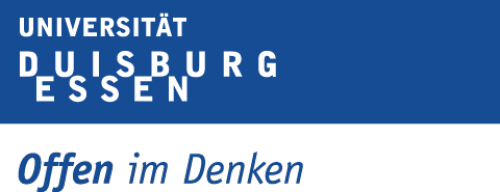Graduate School
for Sustainable Energy Systems in Neighbourhoods
Blog
07.07.2022 NEQ-Works// Simon Slabik
NEQ-WORKS
EXCURSION COPENHAGEN (04.05. - 06.05.2022)The excursion to Copenhagen, which had been planned for two years, could finally take place this year. The occasion was used – after the long corona-related break – to bring many of the PhD students together again in one place and to enable real exchange. The embellished program was created over the period of almost two years: Appointments and exchange opportunities in municipal, ministerial and university institutions formed the core program. City tours and self-organized visits rounded out the excursion.
At the beginning, the doctoral students of the research college NEQ visited the Center for Electric Power and Energy (CEE) at the Technical University of Denmark (DTU). There we were welcomed by Professor Jacob Østergaard. In addition to a short round of introductions, the main research topics and projects currently being carried out at the CEE were presented. The focus of the presented projects is the development of a cost-efficient and sustainable energy system based on renewable energies. In addition, the CEE is investigating heat pumps, solar systems and charging stations for e-mobility for the ongoing transformation of the energy system in Denmark. Particularly impressive is the close collaboration between DTU, various ministries and the public. The transdisciplinary orientation of the projects means that implementation is both accelerated and followed up. The monitoring of the pilot projects takes up a large part of the research results and can provide important information about the efficiency and effectiveness of newly developed solution approaches in the follow-up.
The rest of the day we visited the new urban development project and residential quarter Nordhavn, which is being built in the north of the city on an area of land filled into the Øresund. A total of about 18 million tons of earth will be needed for the expansion over the next three years, much of which can be drawn from the reconstruction of a city metro line. A tour of Konditaget Lüders, a parking garage with a rooftop sports facility and ground-floor shopping, concluded the day.
On the second day of the excursion, the College was invited to the State of Green premises by the Ministry of Foreign Affairs of Denmark and the Danish Energy Agency. The focus of the knowledge exchange was on current issues of transformation, regulations – especially in the building sector – and planned steps for achieving greenhouse gas neutrality in the coming decades. Also, the historical development of the city of Copenhagen as well as the motivation for the ambitious climate goals of the country of Denmark and also the city of Copenhagen were presented.
Afterwards we could win Ms. Monica Magnussen from the City of Copenhagen for an interesting lecture with a special focus on mobility. The expansion of the bicycle infrastructure and the path to climate neutrality by the year 2025 were addressed and discussed. Finally, the day was concluded with a self-organized guided tour of the city, which provided a detailed insight into the urban development of the city from its origins to the 19th century.
The last day of the excursion was another city tour, which started at the Danish Architecture Center in Copenhagen. After a presentation of the central buildings in the harbor area, such as the Danish Royal Library or the Black Diamond, the next stop was the Ørestad district on the southern island of Amager. Since 1992, the district has been developed as a planned city and is continuously being developed further. Not only the large concert hall (DR Koncerthuset) and various buildings that were constructed with renewable or recycled materials were visited, but also the 8Tallet, which forms the end of the marsh landscape to the south and combines interesting approaches to sustainable forms of living as a community housing project.
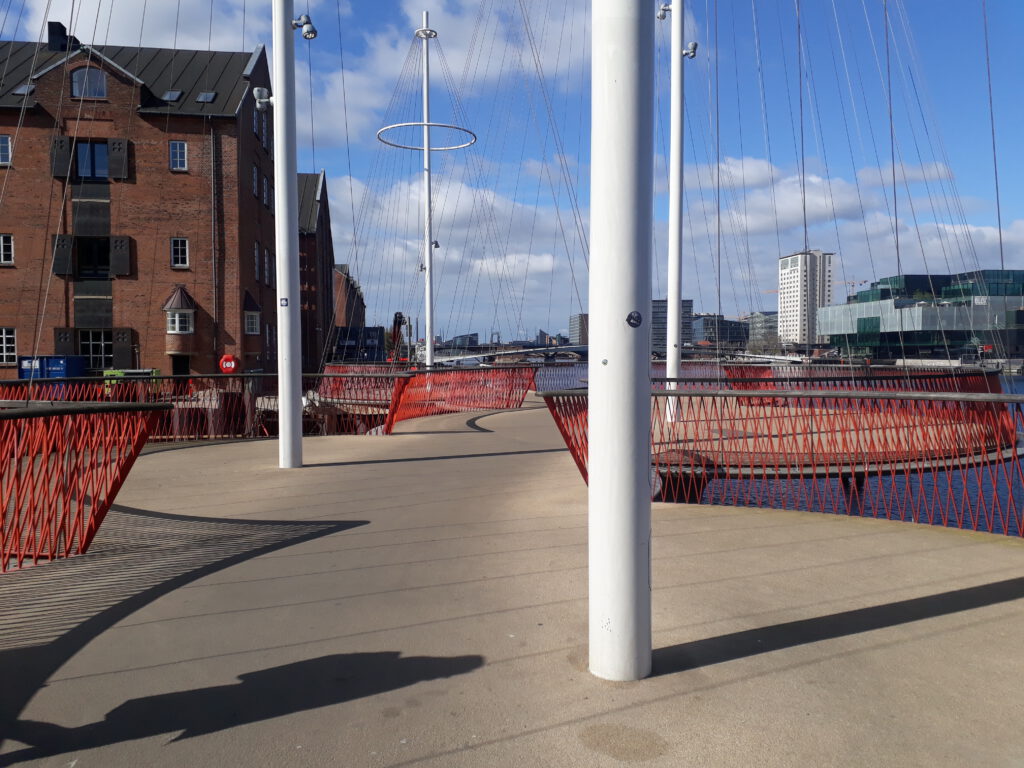
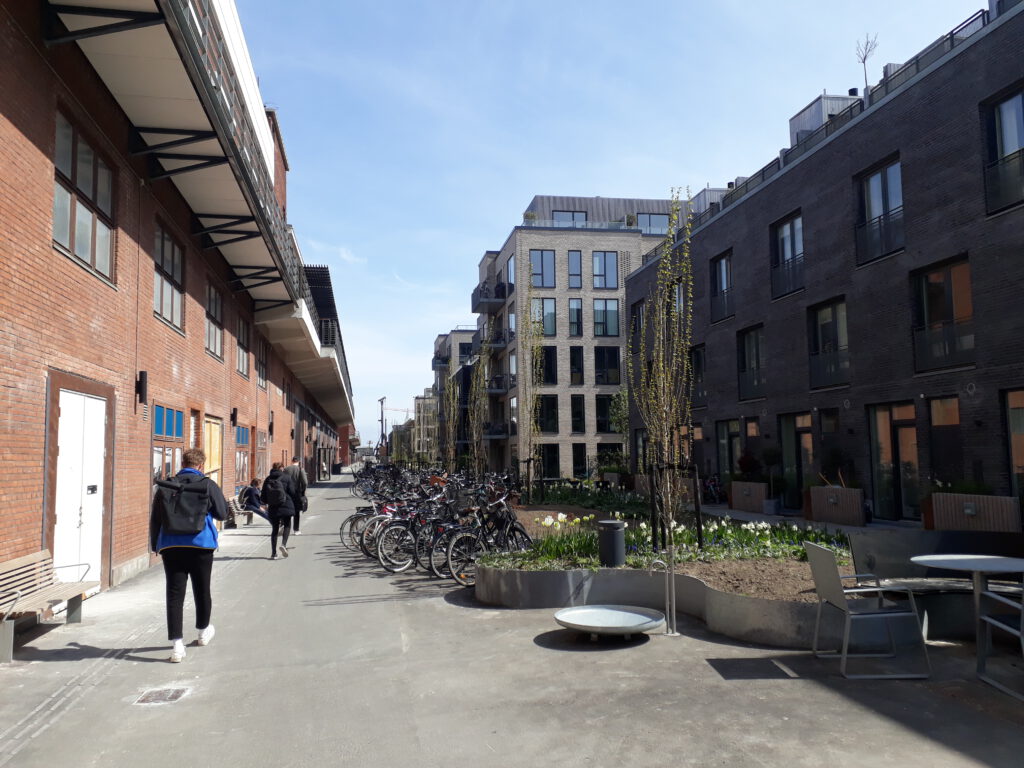
22.04.2022 NEQ-Works// Karen Weseley
NEQ-WORKS
CLIMATE PROTECTION IN COLOGNE - GRADUATE SCHOOL NEQ ON A VISIT TO THE "RHEINMETROPOLE"At the beginning of April, the graduate school NEQ visited Cologne to exchange with experts and visit two climate projects. The first part on the agenda was a meeting with Mr. Perez from the Climate Protection Coordination Office of the City of Cologne. In his presentation, Mr. Perez gave an overview of different strategies and projects in Cologne to reduce emissions and push the city forward in terms of climate protection. During the technical discussion, he provided insights into a tool he had developed that shows the city’s heating consumption at building level. These heat maps provide an important basis for potential energy savings. Following the exciting exchange, the graduate school visited the “Klimastraße”. Within this project of RheinEnergie and the city of Cologne, various measures for CO2 savings were implemented on the Neusser Straße in the district of Nippes. In addition to involving local store owners into operating their shops more climate-friendly, an innovative mobility concept was implemented. With the help of small displays on lamps and signs along the street, drivers can see how many parking spaces are still available. These smart solutions lead to a significant reduction in traffic and make an important contribution to climate protection.
After a short refreshment stop on the “Klimastraße”, the tour continued with a visit to the Stegerwaldsiedlung. As part of the international “GrowSmarter” project, the housing estate, built in 1953, was completely renovated by DEWOG and RheinEnergie, and the heat supply was converted from gas central and central heating systems to electric air-source heat pumps, powered by solar electricity generated in-house. Mr. Remacly from RheinEnergie took over the tour of the quarter and gave insights into the initiation and implementation of the project. He went into detail about the technical design and allowed a tour of the heating systems in the buildings as well as the battery storage for the solar power. In addition to the technical details, he also reported on the communication both at the beginning and during the implementation of the project. He pointed out various barriers as well as drivers among the residents and gave insights which marketing measures and channels were used for activation. The day ended in a relaxed atmosphere with a glass of Kölsch. We thank Mr. Perez and Mr. Remacly for the interesting presentations and the exciting exchange of ideas!

07.03.2022 NEQ-Talks// Anne Graf
NEQ-TALKS
#DBUdigital "SUSTAINABLE MOBILITY IN THE NEIGHBOURHOOD" ONLINE FORUMOn February 23, 2022, Anne Graf and Sören Petermann presented results of their research at the online forum “Sustainable Mobility in the Neighborhood” of the German Federal Environmental Foundation (DBU). In the three-hour forum, the two NEQ members discussed with other participants from science (Andreas Knie and Anne Klein-Hitpaß), practice (Mechtild Stiewe and Doris Bäumer) and population (Tobias Terpoorten) how environmentally sustainable mobility can be implemented at the neighbourhood level. The experts agreed on one central point: An equalization of the means of transport can only succeed if the privileges of the car are removed. Without touching the privileges of the car, the mobility turnaround cannot progress. In addition, the researchers emphasized the great interest of the population in the topic of mobility. Ms. Klein-Hitpaß observed that the pressure of people to suffer has never been so high. The window of opportunity for change and action was now. To this end, Mr. Terpoorten called for bold decisions by policymakers to not only reshape mobility, but to go hand in hand with making the cities of the future livable.
The event was recorded and can be viewed on the DBU YouTube channel.
17.02.2022 NEQ-Talks// Dione Hernández Galvis and Christian Thommessen
NEQ-TALKS ON THE TOPIC "EFFICIENCY INCREASE & DECARBONIZATION IN HEAT SUPPLY UP TO DATE - TECHNIQUES, INVESTMENTS, OPERATING COSTS AND SUBSIDY PROGRAMS"
PRACTICAL INSIGHTS FROM AND DISCUSSION WITH THORSTEN COß, MANAGING DIRECTOR AVU SERVICEPLUSPractical relevance is of great importance within the framework of our Graduate School NEQ. As part of the continuation of the predecessor Graduate School EEQ, our research focuses more closely on the implementation of business models for the energy transition. In this context, we were very pleased that Mr. Thorsten Coß from AVU Serviceplus in Gevelsberg gave us practical insights into current planning and implementation processes of different energy efficiency and energy utility projects against the background of technical, economic, legal, ecological as well as social issues at the NEQ Talks on February 17, 2022. Afterwards, there was a lively debate among all the professors, experts and students present, both internal and external to the college. Some of the findings of the meeting are briefly described below.
While the fundamental necessity of increasing efficiency and reducing energy consumption in space heating and hot water preparation in existing buildings with their individual user-dependent requirements is completely undisputed, the concrete implementation of sustainable building and energy concepts is very complex. In contrast to isolated pilot projects, there is a lack of truly functional and practicable approaches and standardized solutions that are comprehensible and economically sustainable for the stakeholders concerned and thus, reduce the fear of investment decisions. In addition, technical restrictions on refurbishment in existing buildings result in the need for far-reaching decarbonization of the energy sources that will have to be used in the future heat supply. In densely populated neighborhoods, appropriately modernized district heating networks are suitable even if no refurbishment measures can or may be carried out on existing buildings. In rural areas, heat pumps are a key technology, but energy-related renovations must be carried out first. Finally, social compatibility plays an essential role in the course of such capital-intensive transformations of (decentralized) heat supply. Municipal heat plans, as they are already legally binding in the federal states of Hamburg or Baden-Württemberg, can be a remedy in this regard, in order to create the balancing act between ecologically sustainable supply solutions and those that are economically justifiable for all parties involved.
The next date for our NEQ Talks is on 23 June2022 at 18:00 again in digital format via Zoom. As usual, further information and dial-in dates for the event will be announced on our homepage.
10.02.2022 NEQ-Works-Session// Dione Hernández Galvis
NEQ-WORKS
CAREER PATHS. THEMATIC FIELD: POLICY ADVICEThe second NEQ-Work meeting of this year took place on 10 February 2022. With a view to the final stages of our project, we are now focusing on the paths we will follow once the project ends, that is the reason why during this meeting we welcomed three persons to share with us their experience pursuing a career in policy advice. After discussing some internal and organisational points regarding the upcoming tasks and activities of the project, we proceeded to welcome Mr. Manfred Rauschen, Mr. Dr. Marcus Greve and Ms. Andrea Pfeiffer (née Wagner).
Mr. Manfred Rauschen, graduated economist, and Managing Partner of the Öko-Zentrum NRW GmbH, told his experience, starting with his studies and then working for the city of Hamm, which led him to his current position, as well as being a partner in different companies, including two Japanese companies. Mr. Rauschen also focused on elucidating the relationship and balance of work and personal life, as well as the importance of promoting interaction and harmony among his employees, which leads to higher performance and overall satisfaction.
Afterwards, Mr. Dr. Marco Greve, Industrial Engineer with a specialisation in European Energy Management of the TU Dortmund and current Managing Director of ef.Ruhr GmbH, besides explaining the chronological development of his career, reported on the main tasks of his current job. Then, going into a little more detail, Dr. Greve proceeded to explain what motivates him both in the work and personal environment, as well as which personality traits he values the most, not only in himself but also in others. He explained how he finds the balance between the importance he gives to his family as well as his team and how the ability to see every challenge as an opportunity has led him to move forward in his professional path. All this without neglecting sporting activities, travel, and interpersonal interactions.
Then in the afternoon we received Ms. Andrea Pfeiffer (née Wagner), who is currently working for the Ministry of Economics, Innovation, Digitalization and Energy of North Rhine-Westphalia as a Policy Expert. Ms. Wagner is known for his work concerning the conception and the creation of the Graduate School before she proceeded to pursuit her current career path. Ms. Wagner shared her experience working for the ministry, as well as the advantages and disadvantages that this work can bring. She also mentioned some of the challenges she has faced in her work and personal life, and how the decisions she has made throughout her life have been the right ones in her particular professional journey.
Each of the presentations was followed by a lively round of questions from the doctoral students, who were particularly interested in the characteristics that each of the presenters were looking for in their employees and how it would be possible to have a balance between personal and professional life by choosing one of these paths in the future. The round of questions also served to give some feedback to the presenters on what things are important for the doctoral students when searching for an employer and starting a career in a specific field.
We thank the presenters for taking some of their valuable time to share with us their interesting life paths and for giving us some clarity on what the future might hold for us should we decide to follow in one of their footsteps.
It is with great anticipation that we prepare for our next workshop concerning career paths, which will take place on 10 March 2022 and will be more focused on a career in the public administration.
18.11.2021 NEQ-Talks// Post by Simon Slabik
NEQ-TALKS
THE GREEN VILLAGE IN COLOGNE-CHORWEILEROn November 18 the fifth event in the NEQ Talks series took place. This time, the focus was on the “Green Village” in Cologne-Chorweiler, which was presented by architects from APG Cornelia Franz, Bernd Krömmelbein and Muharrem Pasli.
The impulse lecture was introduced with a description of the historical urban development in Cologne and Cologne-Chorweiler. Essential characteristics of the district and the population development as well as structure were put into context. After the urban development framework was presented, the speakers addressed the multitude of main topics in the project. In addition to mobility aspects, supply and care facilities as well as the energy supply concept, the structural and energetic quality of the building was further presented. The terraced building creates a large area for communal urban gardening, bringing the neighborhood’s population together.
Following the impulse lecture, the presented topics were discussed in detail. The direct reference to the implementation in connection with scientific approaches and considerations were central elements here. We would like to thank the speakers for the exciting insights into the project and the participants for the lively exchange.
17.11..2021 NEQ-Talks// Post by Lisa Taruttis
NEQ-TALKS
THE SUMMER BREAK IS OVER - NEQ TALKS ARE BACK!On October 28, 2021, our NEQ Talks series went into the next round with the title “Development of a sustainable and economic energy supply for cities and municipalities”. Three experts from science and practice were invited: Jana Rasch from the Entwicklungsagentur Region Heide, Ilka Hoffmann from the FH Westküste, and Anne Nieters from Fraunhofer IFAM. All three are involved in different areas of work in the QUARREE100 project, which was the focus of the three keynote speeches!
Jana Rasch opened the round with an overview of the project. One of the goals of a resilient energy system is to ensure regional supply stability – even in extreme situations and other uncertainties. Since this can conflict with a purely efficiency-driven solution, the QUARREE100 project aims to identify and model the optimal balance between energy efficiency and supply security in the Heide region. Ilka Hoffmann then reported on legal framework conditions and difficulties in implementation. Last but not least, Anne Nieters gave an insight into regional economic effects that can be generated in the Heide region through the implementation of the project.
All in all, there were many interesting insights into the project, both with regard to the scientific and theoretical basis as well as with regard to the implementation, including the difficulties that arise time and again. We would like to thank the three speakers for their exciting presentations and the participants for a lively discussion afterwards!
30.09.2021 NEQ-Works// Post by Christian Thommessen
NEQ-WORKS-SESSION 30.09.2021
JOINT PLANS FOR THE FUTUREBecause of the ongoing Corona pandemic, our NEQ-Works took place again in digital format on Thursday. Various organizational topics and contents were discussed and further developed. Among other things, we agreed on a date for a joint training on further career planning. We also set a new timeframe for our excursion to Copenhagen at the beginning of May next year. In addition, we were invited by the German Chamber of Industry and Commerce (IHK) to the “intelligent buildings” conference which will be held in Dortmund in December of this year. Some relevant contributions from members of the graduation school will be presented in a session in the so called Petcha Kutcha lecture style.
We are all happy that these activities – as of today – are again scheduled as face-to-face sessions. Hopefully, these will not remain the last opportunities for inter- and transdisciplinary exchange in persona. We would like to take this opportunity to thank the state ministry for approving our application for project extension and thus setting the course for further steps towards a professional dissemination. Speaking of dissemination: in the NEQ-Works-session we developed a draft outline for our final workbook, which should be published by the end of the graduation school. Various contents from the professors and experts of our practice advisory board are planned in addition to contributions from all doctoral students, in which the various dissertations will be teased.
28.09.2021 NEQ-Works// Post by Karen Weseley
NEQ-WORKS
"ENERGY SERVICES IN NEIGHBORHOODS" -7th SERVIVE CONFERENCE IN ROSTOCK AND BEST PAPER AWARD
From September 9th to 10th, 2021, the seventh service conference took place in Rostock. As part of a poster presentation with the title “Energy services in the neighborhood – An investigation of the decision-making process of private homeowners to participate in energy-efficient utilization models”, Karen Wesely gave insights into the research results of her current study.
The implementation of energy-efficient systems in neighborhoods, such as district heating, leads to numerous challenges for service providers. In this context, energy consultants as well as contractors have to deal with different needs of private homeowners and harmonize interests. Therefore, a deeper insight into the decision-making process to connect to district heating is essential in order to address homeowners’ needs and successfully manage the implementation of district heating. In the course of this investigation, especially dependency concerns of private homeowners were identified. These barriers do not only include the “supplier lock-in” situation and technical concerns regarding district heating, but also perceptual biases. To address these biases, practical implications for service providers, such as energy consultants and contractors, were derived. In the end, the poster presentation won the Best Poster Award. Thank you very much for the exciting exchange of ideas and nice evening at the Rostock harbor to end the conference!
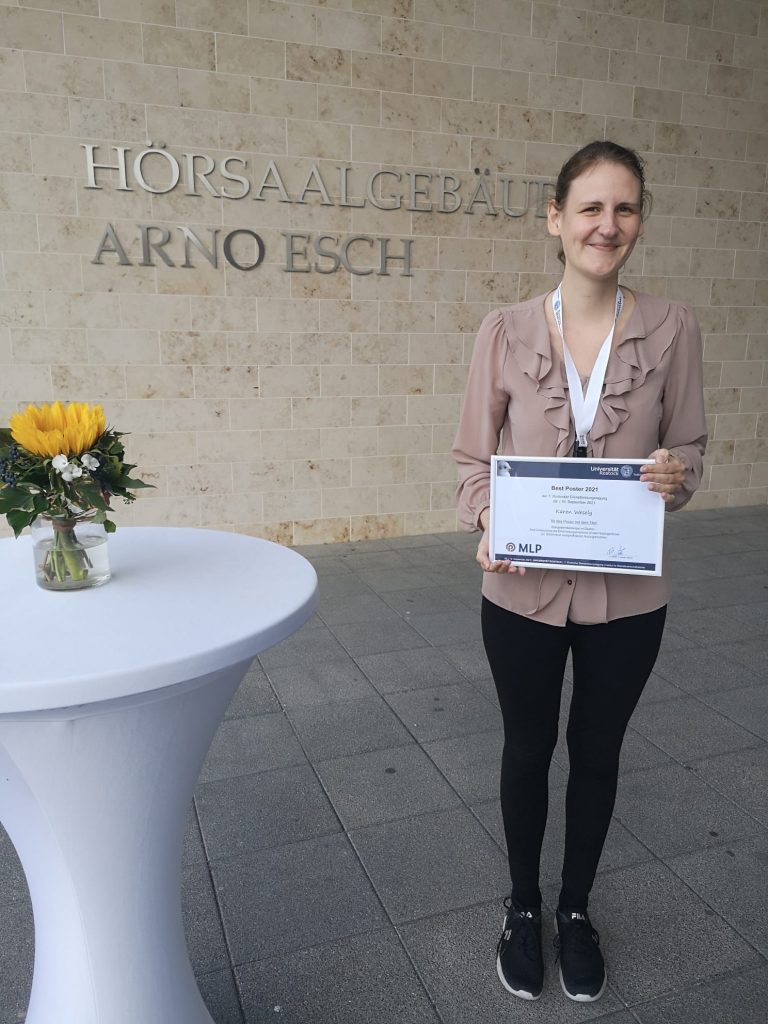
26.04.2021 NEQ-Works// Post by Antonia Stratmann, Mona Treude, Sina Diersch und Anne Graf
NEQ-TALKS
KICK-OFF EVENT FOR OUR NEW DIGITAL ROUNDTABLEOn 18.3.2021 we introduced our new digital roundtable – NEQ Talks. We are using the Corona pandemic to digitally exchange and network with experts from different subject areas. This format is open to the fellows of the Graduated College NRW – Sustainable Energy Systems in Neighborhoods- as well as to the interested public. From 6:00 p.m. to 7:30 p.m. in the coming months, we will invite experts to enter into a dialogue with you on the topic of sustainable energy systems in the neighborhood.
Our first guests, experts in the field of participation in the energy transition, Dr. Sonja Knobbe and Dr. Jan-Hendrik Kamlage from the Center for Environmental Management, Resources and Energy (CURE) at the Ruhr University Bochum, reported on their experiences and research areas in these exciting and important topics. First, the two speakers gave an insight into their projects and research work. We learned that participation in the energy transition plays a central role when it comes to the dimension of implementation. For the success of the energy transition, as a transformation project for society as a whole, civic engagement and participation are needed in order to arouse acceptance and the will to actively participate, for example in the form of behavioral changes or financial expenditures. And there are numerous, well-tested methods and opportunities for this.
In a subsequent lively discussion with about 30 participants, we as doctoral students, but also the other visitors of the evening, were able to ask in-depth questions and deepen our knowledge regarding participatory models and application.
At this point, we would like to thank the two experts once again!
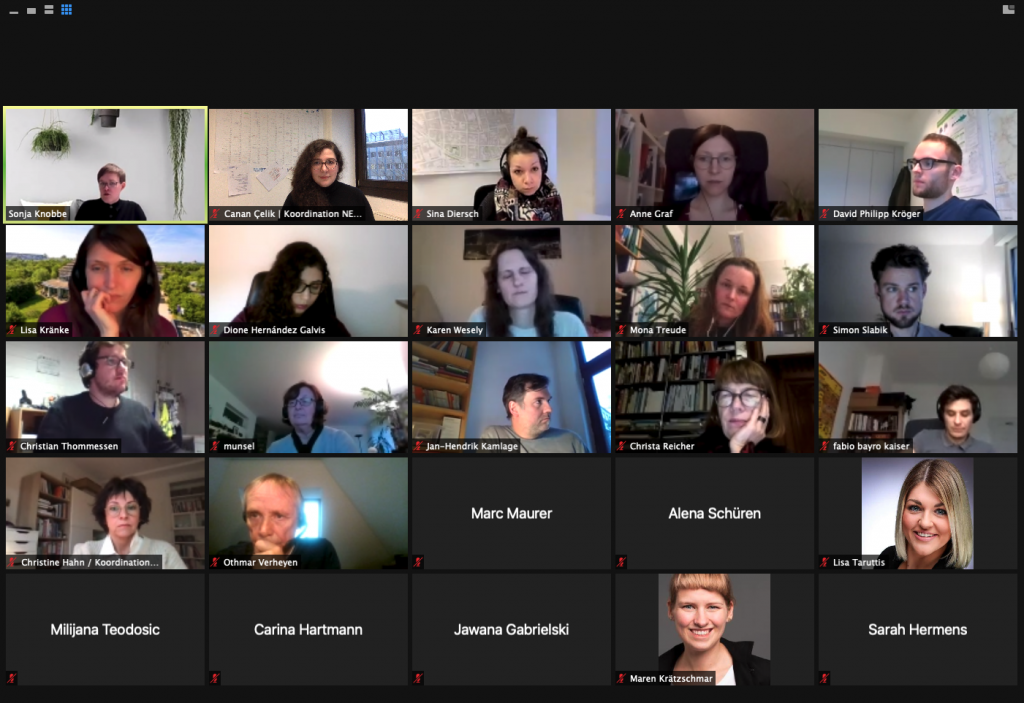
19.04.2021 NEQ-Works // Post by Lisa Taruttis
NEQ-WORKS-SESSION 15.04.2021
INTERDISCIPLINARY EXCHANGE ABOUT THE DISSERTATIONSOn Thursday, 15.04.2021, our third NEQ-Works session took place – due to pandemics once again virtually! And even though we are all used to Zoom and Co by now: we can hardly wait to meet again in person sometime in the (hopefully not too distant) future! After a short discussion of several organizational topics, we went straight to work.
While the last session focused on the exchange with partners from practice, we – the doctoral students – had a lot of time to talk among ourselves about the individual dissertations. For this purpose, we were divided into different small groups, just like last time – because it definitely works better in groups of three or four than in a plenary session. After about an hour, there was a short coffee break before we went into the second round with newly mixed groups.
In the individual break-out sessions, the participants each gave a short insight into the status of their dissertations, so that a discussion about various topics arose. For example, there were discussions about data sources and different possibilities for data collection, as well as about methodologies and software for analysis. References to helpful literature, if any, were also brought forth. In addition, at least in some groups, the schedules of the PhDs were in focus, because things are going more or less well everywhere, but thanks to the pandemic definitely not always according to plan!
With a good hour of discussion time per break-out session, there was – in addition to the interdisciplinary exchange – fortunately also the one or other minute to simply get the problems in the everyday life of scientific employees during a pandemic off their chest! It was really good to hear that most of us are going through a similar situation and that we are not alone with our problems and worries!
Finally, there was unanimous positive feedback to our two coordinators for the successful format of virtual discourse! We would like to take this opportunity to thank Canan and Christine once again for their work and effort in bringing us back to the exchange in different ways!
23.03.2021 NEQ-Works // Post by Dione Hernández Galvis
NEQ-WORKS SESSION
MARCH 4th, 2021On Thursday, March 4th, 2021, we held our second NEQ-Works session continuing with our latest online formats. The NEQ-Works sessions focus not only on the intensive interaction amongst the doctoral candidates, but also on the collaboration with external partners that enrich the sessions through their background and expertise. We were delighted to have had our praxis partners take part on our most recent online meeting.
The NEQ-Works session served to propel the transdisciplinary effort between the doctoral candidates and the praxis partners. The participants took part in different breakout sessions during the day. The distribution of the participants occurred thematically. In this way, the doctoral candidates had the opportunity to present the latest advances in their research, as well as to pose specific praxis-related questions.
For the doctoral candidates it was important to understand in depth how their academic work can be of advantage and applicable in the praxis. Therefore, some more general questions were also addressed, as for example when it comes to innovative academic work, what are the expectations and wishes of the praxis? What formats are they willing or eager to work with? As expected, the views regarding these issues varied, but they allowed for an improved understanding and rapport between the Graduate School and the praxis.
The sessions in plenum were key to appreciate the different approaches taken in each cluster and how the viewpoints differ from one discipline to another, strengthening once again our interdisciplinary work. The meeting ended with an update from the project coordination on the current activities and objectives of the Graduate School, which offered the members of the praxis a general overview of our work during the last year and our goals for the future.
With the NEQ-Works and NEQ-Talks sessions we intend to diversify the format of the activities undertaken by the Graduate School and we are pleased with the results obtained so far.
11.02.2021 Conference // Post by Karen Wesely
IICSEE HAWAII 2021
ALOHA HAWAII - 5th IAFOR CONFERENCE ON SUSTAINABILITY, ENERGY & THE ENVIRONMENT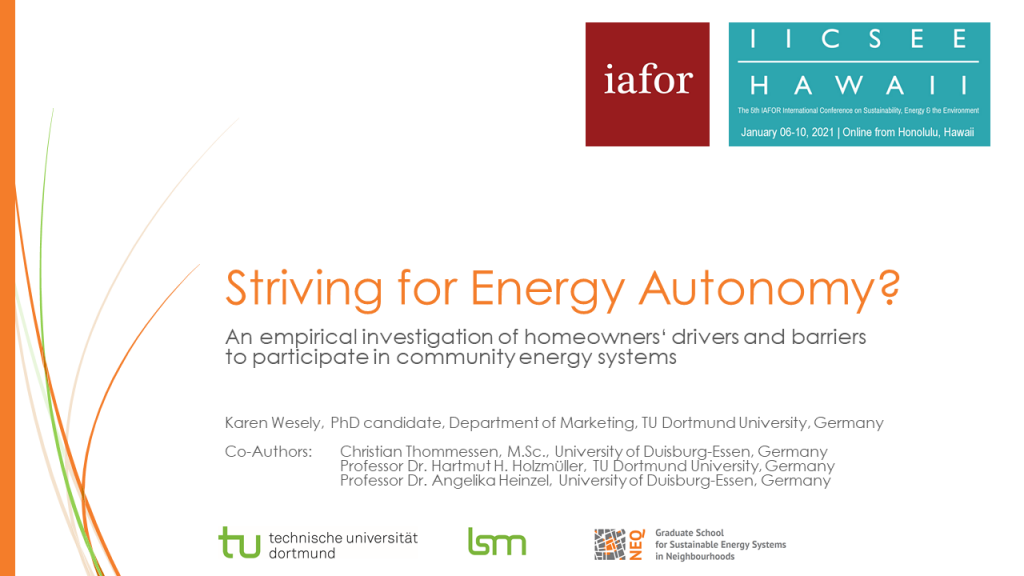
2021 started with the IICSEE 5th IAFOR Conference on Sustainability, Energy & the Environment taking place in Hawaii from January 6th to 10th. Unfortunately, due to the COVID-19 pandemic and lockdown, the conference could not be attended in person. Therefore, the beautiful beach surrounded by palm trees could only be admired as a virtual background in the Zoom-livestream sessions. Nevertheless, the conference offered a variety of intriguing presentations reaching from climate change and sustainability to education.
Christian Thommessen from the University of Duisburg-Essen and Karen Wesely from TU Dortmund University have submitted an article with the title “Striving for Energy Autonomy? – An empirical investigation of drivers and barriers of homeowners to participation in community energy systems“. Concentrating on district heating, the authors focused on the construct of subjectively perceived energy autonomy. Using an explorative research design, qualitative interviews with private homeowners as well as experts were conducted to shed light on the drivers and barriers for homeowners to participate in community energy systems (CES). In the context of CES, a concept that has been mentioned by the interviewees but is rather unexplored so far is the construct of subjective energy autonomy. Although connecting to district heating can represent a more energy-efficient, comfortable, and even cost-efficient alternative, homeowners’ willingness to connect remains low. Instead, individual fossil-fueled heating systems are preferred because they are perceived as representing a higher degree of independence and control over the energy system. Although, from a technical perspective this is not the case. This interesting perceptual mismatch was examined from an engineering as well as marketing perspective and practical implications were derived for marketers and technicians. Thus, this research is in good alignment with the idea of the Graduate School for Sustainable Energy Systems in Neighborhoods since an interdisciplinary approach was inevitable for investigation and to provide novel insights.
You can find the pre-recorded online presentation here. The same called paper by Christian Thommessen, Prof. Dr. Hartmut H. Holzmüller, Prof. Dr. Angelika Heinzel, and Karen Wesely will be published in the official conference proceedings of the IICSEE 5th IAFOR Conference on Sustainability, Energy & the Environment.
20.12.2020 Conference // Post by Anne Graf
11th PEGASUS ANNUAL CONFERENCE 9./10. OCT 2020
"MOBILITY AND TRANSPORT IN TRANSITION. EVERYDAY LIFE - PROCESSES - INFRASTRUCTURES"Like many other conferences, the annual conference of the Pegasus network for young researchers in mobility and transport research took place digitally this autumn. Even though the digital format made it difficult to get to know each other and network in person, the conference in digital format benefited from a significantly higher number of participants.
One of the highlights of this year’s conference was the science slam “Mobility in times of Covid-19”. In short presentations, various perspectives on the changes in the field of mobility and transport due to the Corona pandemic were presented by international scientists as well as experts from the field.
I presented my dissertation project on sustainable mobility in the neighbourhood in the session “Transport Change and Urban Development”. The numerous tips and suggestions in the subsequent discussion provided important information for further steps of the project.
10.12.2020 Conference // Post by Mona Treude
SUSTAINABLE SMART CITY
OPENING A BLACK BOXCities are becoming digital and are aiming to be sustainable. How they are combining the two is not always apparent from the outside. What we need is a look from inside. In recent years, cities have increasingly called themselves Smart City. This can mean different things, but generally includes a look towards new digital technologies and claim that a Smart City has various advantages for its citizens, roughly in line with the demands of sustainable development. A city can be seen as smart in a narrow sense, technology wise, sustainable or smart and sustainable. Current city rankings, which often evaluate and classify cities in terms of the target dimensions “smart” and “sustainable”, certify that some cities are both. In its most established academic definitions, the Smart City also serves both to improve the quality of life of its citizens and to promote sustainable development. Some cities have obviously managed to combine the two. The question that arises is as follows: What are the underlying processes towards a sustainable Smart City and are cities really using smart tools to make themselves sustainable in the sense of the 2015 United Nations Sustainability Goal 11? This question is to be answered by a method that has not yet been applied in research on cities and smart cities: the innovation biography. Based on evolutionary economics, the innovation biography approaches the process towards a Smart City as an innovation process. It will highlight which actors are involved, how knowledge is shared among them, what form citizen participation processes take and whether the use of digital and smart services within a Smart City leads to a more sustainable city. Such a process-oriented method should show, among other things, to what extent and when sustainability-relevant motives play a role and which actors and citizens are involved in the process at all.
05.11.2020 Virtual doctoral student meeting// Post by Anne Graf
VIRTUAL DOCTORAL STUDENT MEETING
ZEFIR 29.10.2020On Thursday, 29 October, the last doctoral students’ meeting of the college took place in this form for the time being. The doctoral students met virtually via a video chat platform and gained insights into the research and work priorities of the Centre for Interdisciplinary Regional Research – ZEFIR for short – and the Department of Sociology City and Region through lectures and reports by Prof. Dr. Sören Petermann, Dr. David H. Gehne and Katharina Schwabe.
The ZEFIR research institute is part of the Faculty of Social Sciences at the Ruhr University Bochum. Its main areas of research include structural change in the Ruhr region, social inequality and family and child policy. The spatial focus of research and activities is on the Ruhr area. The projects are often carried out in cooperation with ministries or local authorities and are financed by grants from foundations or ministries.
A further central component of the doctoral student meetings is the presentation by a doctoral student on the status of the dissertation and current issues. Anne Graf reported on the progress of her project on sustainable mobility in neighbourhoods. She gave insights into the selection process of her research areas and the current status of an ongoing survey.
As all the chairs, institutes and dissertation projects involved in the Research Training Group have now been presented, future meetings of doctoral students will take place in a different format. Therefore the last part of the meeting was used to organize and plan the new formats NEQ Works and NEQ Talks. The Works-Sessions serve to intensify the exchange and cooperation between colleagues. A series of talks is intended to make the transdisciplinary work of the college more visible. Lectures on the topics of the Research Training Group, which explicitly take into account international, academic and practice-based perspectives, are intended to highlight the exchange beyond the borders of the Research Training Group.
29.10.2020 Workshop// Post by Antonia Stratmann and Christian Thommessen
WORKSHOP
GENDER AWARENESS IN SCIENCEIn October 2020, the NEQ colleagues dealt with gender bias in scientific practice at a seminar. The training was led by Philipp Wronker, who worked in the Equal Opportunities Office of the University of Frankfurt before joining RWTH Aachen University. The seminar focused on the questions “Which gender bias currently prevails (subconsciously) in science” and “How can equality and diversity be strengthened while working in science?
By illustrative examples (videos, pictures, etc.), the colleagues were shown to what extent the topic also affects the daily activities of the chairs and institutes and what should be taken into account when preparing a doctorate. Since the continuing education took place digitally, smaller discussion groups were formed and the doctoral students worked on various questions together and then compiled the results in a large group.
In the lively discussions, some of them reported that the topic of “gender” had not seemed so present to them before, while others had and still have more contact with the topic. On the basis of the examples given, the NEQ doctoral colleagues would like to make a contribution in this context.
Looking back on the seminar, it can be said that the exchange of experiences with the lecturer and the colleagues was and still is very important not only with regard to the topic of this workshop. The NEQ colleagues very much appreciate the opportunity to take part in such an exchange.
01.10.2020 Virtual doctoral student meeting// Post by David Kröger
VIRTUAL DOCTORAL STUDENT MEETING
IE³ TU DORTMUND 24.09.2020On 24.09.2020 the Institute of Energy Systems, Energy Efficiency and Energy Economics (ie3) of the TU Dortmund University invited to a virtual meeting of doctoral students. After a greeting of the participants and an introduction to the institute by the head of the institute Prof. Dr.-Ing. Christian Rehtanz, a presentation of the research project KonVeEn was given by the staff member of the chair Jan Peper. The project examines the effects of the traffic turnaround on electricity markets and grids. Current insights into the modelling of the transport sector in energy system analysis were given and subsequently different mobility concepts were discussed.
In the following, David Kröger presented current preliminary results of his research project with focus on the effects on the European power plant dispatch due to an increasing electrification in the heating sector considering the residential building stock.
The final interdisciplinary exchange focused on the topic of CO2 pricing. Based on guiding questions, various mechanisms and design options were discussed with regard to the assessment of the CO2 price and the use of the revenues.
03.09.2020 Research Colloquium// Post by Dione Hernández Galvis
RESEARCH COLLOQUIUM
2020
On Thursday, August 27, 2020, the second research colloquium of the Graduate School for Sustainable Energy Systems in Neighbourhoods took place. It was a virtual meeting due to the COVID-19 restrictions.
Professors and lead researchers from each institute/department attended the meeting, which allowed for an intensive and interdisciplinary exchange. Despite the circumstances, we had a fantastically interactive session, where the topics of each doctoral candidate were not only analyzed within the same research cluster, but also between diverse disciplines. The dynamic for this year’s colloquium consisted of two breakout sessions, which concluded with a feed-back round.
The first break-out session corresponded to each one of the Graduate School’s clusters: Conversion of energy infrastructures – interaction between buildings – energy system – users; Activate actors/users/owners – Implementation of joint forms of use in new buildings; Establishing new courses of action – procedures for sustainability at neighbourhood level; Designing the framework conditions for implementation – Effects of the superordinate system on the neighbourhood. Here the doctoral candidates were able to present their topics and to get highly qualified advice from academic experts. Next, the second break-out session was structured with even smaller groups from different disciplines. The division of the groups responded to the doctoral candidates’ wish to interact more deeply with professors from other academic branches, in order to further intensify the respective interdisciplinary aspects of the individual thesis topics.
The meeting concluded with the participation of all participants in a dialogue, where proposals, advices, doubts, and suggestions were brought up to be considered in future meetings.
All participants agreed that the coordination did an excellent job in organizing this event, which allowed the meeting to be successful and the objectives to be fully met.
We are all looking forward to the next research colloquium on Thursday, August 26, 2021, as well as to the participation of the Graduate School at the Conference “REAL CORP 2020: Shaping Urban Change – Livable City Regions in the 21st Century” on Thursday, September 17, 2020, where first results and research insights will be presented.
27.08.2020 Scientific Writing// Post by Anne Paulus and Karen Wesely
SCIENTIFIC WRITING
MODULE 2: COHERENCE AND UNITY
The workshop “Scientific Writing 2“ took place in August. An essential part of every dissertation project is to write scientific papers in English and publish them in international journals. Nevertheless, this process can be quite challenging and tricky. Translation software as well as reading English academic literature can only offer limited help. Therefore, the workshop “Scientific Writing 2” was held for the PhD students of the Graduate School NEQ. In virtual sessions, various insights and useful tips were given to linguistically refine their future academic articles and get to know the potential pitfalls of scientific English.
Leyla Haferkamp, coordinator for scientific writing at RWTH Aachen and with a degree in linguistics and philosophy, led the workshop and helped the PhD students of NEQ to gain new insights into improving their academic texts in English. Besides valuable tips, she aided with structuring scientific texts and linking paragraphs via transition signals as well as stress positions. Furthermore, she recommended to develop one’s own editing check list to always use when writing scientific articles in English. Regarding this, “coherence” and “unity” should be kept in mind all the time to improve academic texts. The workshop helped to develop clear and structured argumentations as well as to formulate them in a reader-friendly and comprehensible way. Examples, exercises and self-study-phases illustrate the new methods.
The highlights of the workshop were private writing consultations for each PhD student of NEQ. In this context, the students had a unique chance to send English excerpts of their scientific manuscripts and get a detailed feedback. By analyzing each text in detail and uncovering linguistic uncertainties in scientific English, individual support and instructions could be given. To put it in a nutshell, the workshop was a great opportunity to get useful tips to meet the high standards of scientific writing in international academic literature.
We thank Ms. Haferkamp for the fantastic workshop and looking forward to another exciting session in October!
25.08.2020 Virtual doctoral student meeting// Post by Sina Diersch
VIRTUAL DOCTORAL STUDENT MEETING
INSTITUTE FOR MOBILITY AND URBAN PLANNING (IMOBIS) 20.08.2020On August 20, 2020, the doctoral students of the Graduate School exchanged information about their research activities virtually for the third time. This time at the Institute for Mobility and Urban Planning (imobis) at the University of Duisburg-Essen. imobis – formerly the Institute of Urban Planning and Development (ISS) – was newly founded in June 2019 and aims to combine the disciplines of mobility and urban planning in one chair. The participants were welcomed by the institute’s director Prof. Dr.-Ing. Dirk Wittowsky who presented the different research activities of the institute. These include projects dealing with the change in mobility behavior with special emphasis on behavioral economics, digital transformation, sustainable urban logistics and dialogue processes. One of these projects, which was completed this year, is the project NEMO – New Emscher Mobility, which was presented by the former head of the ISS, Prof. Dr. J. Alexander Schmidt. In NEMO, an interdisciplinary team of scientists is investigating what a sustainable mobility system in the Emscher area might look like. For this purpose, Janka Lengyel developed an urban development model (Multiscale Urban Model (MURMO)) as part of her PhD, on which she gave a short introduction. Afterwards, Sara Klemm gave an exciting insight into the current research projects of MobilitätsWerkStadt Essen 25 and Gladbeck MobilitätsWerkStadt – Mobilität für Alle. After the presentation of the current and completed research projects, Sina Diersch presented the current status of her dissertation with the working title ‘ Experimental Space City – Experiencing active mobility through temporary design of urban mobility spaces’. Further information on the imobis research projects can be found here.
Subsequently, organizational points such as the preparation of the upcoming research colloquium and the presentation of the updated work plan and the individual adjustments to the corona measures had to be discussed.
Even though the virtual meetings enable the doctoral students to continue to work together constructively and to exchange ideas, we are looking forward to meeting again in person in the near future.
23.07.2020 Conference// Post by Lisa Taruttis
FUTURE FORUM ON ENERGY SYSTEM TRANSFORMATION
ACTIVELY SHAPING CHANGE
On 20 and 21 November 2019, the Future Forum on Energy System Transformation took place in the documenta-Halle Kassel. The central themes included “Energetic urban redevelopment”, “Sector coupling”, “Citizen energy” and “Renewable energies and energy efficiency”. More than 650 participants from all over Germany attended the event, which was organised by deENet together with 7 partners and numerous other supporters. Under the motto “Bring your energy for change”, visitors discussed the above-mentioned topics with actors from politics, business and science in order to advance decentralized energy supply and global climate protection. On the 1,400 m² exhibition area of the documanta hall, 35 exhibitors gave insights into their working world and presented their products and services to the visitors. Among the exhibitors were companies such as E.ON, innogy SE and Daimler AG, but also various interest groups such as the Hessische LandesEnergieAgentur (LEA) or the Sonneninitiative e.V., as well as players from science and research, such as the Frauenhofer IEE. In addition to the exhibition stands, there were also parallel thematic forums, which were divided into different blocks. The forums were individually designed – lectures, panel discussions, impulse contributions or even discussions with the audience. Many forums had a close thematic connection to our colleague, which made the event all the more interesting. Forum 3, for example, dealt with “Energy issues in the neighborhood” and how to solve them; in parallel Forum 4, various speakers discussed the question of how to reach and mobilize homeowners for modernization measures to achieve the energy turnaround. Cooperative neighborhood approaches to climate protection and municipal networks for energy and resource efficiency were also discussed in other forums. All presentations and materials were subsequently forwarded to interested visitors by e-mail, so that they were also able to gain insights into the parallel sessions. An artistic supporting programme, which showed ambitious works of art in the field of renewable energies and environment, as well as the award ceremony of the Hessian State Prize for innovative energy solutions rounded off the event. This year again, a Future Forum will take place in November, this time on the subject of “Energy & Climate” and in times of COVID-19 as a virtual event.
02.07.2020 Scientific Writing// Post by Mona Treude and David Kröger
SCIENTIFIC WRITING
MODULE 1
On four dates in July and August 2020, the participants of the NEQ Research School participated in a workshop on scientific writing. The workshop was organized and conducted by the Writing Center of the RWTH Aachen University. Aims of the workshop are the improvement of writing skills and the promotion of creative writing. The first units of the module dealt with questions regarding the sentence and word level, the micro editing. In the introductory lecture, important key concepts, such as clarity, conciseness, coherence, consistency, accuracy, dynamics, were introduced and explained using many examples. The general remarks as well as concrete tips from the lecturer helped to critically question one’s own writing and to improve individual writing skills. In the exercises that followed, what was learned could be applied to strengthen the new knowledge. In addition to the group sessions, the participants were provided with a variety of materials for self-study. Overall, the workshop provided valuable ideas for science communication and for the improvement of extra-curricular skills.
25.06.2020 Research workshop// Post by Antonia Stratmann, Simon Slabik, Sina Diersch and Anne Paulus
INTERDISCIPLINARY WORK
RESEARCH WORKSHOP AS AN INSTRUMENT
Scientific research often means working exclusively in and with one’s own field of expertise. This applies to processes, content and methods. Disciplinary research, however, quickly reaches its limits in practice, as there are often causal relationships and questions from different disciplines. Particularly in the area under consideration in the neighbourhood, complex questions often arise for the colleagues, which require multi-perspective approaches. The aim is to bundle disciplinary competences and to enter into an exchange with other disciplines in order to be able to take a comprehensive look at research.
The cooperation across the disciplines is one of the challenges that often have to be dealt with at the NEQ. One instrument for this is the principle of the Research Workshop, in the context of which four colleagues have jointly reviewed the qualitative method of coding for a research project, which originates from the social sciences. Accordingly, knowledge from the disciplines of spatial planning, geography, civil engineering, sociology and psychology was incorporated into this interdisciplinary work.
The process of the research workshop was characterized by three steps:
Firstly, a telephone enquiry was made to find out more about the method and to clarify the general conditions. In this way a common language and understanding of the methodology could be found. Also in this context, the materials and documents for conducting the review of the methodology were sent out.
In the second step, the colleagues were given time to study the documents and to work on them independently.
In the last step, we sat together digitally and discussed the results. This form formed the core of the interdisciplinary, multidisciplinary work.
As a result it can be said that the sometimes very different views, approaches and also the handling of the methodology and the tasks led to a product and new knowledge gain for all participants. The research workshop helped to reflect own assumptions and discuss additional perspectives and distinction between related topics.
Through the research workshop new contents for the research work as well as a new handling of the methodology have been learned. We were thus able to take new impulses for our research work and beyond. The research workshop showed us how important an exchange beyond one’s own discipline is, because this way new impulses for thinking and solution processes can be developed.
04.06.2020 Virtual doctoral student meeting// Post by Mona Treude
VIRTUAL DOCTORAL STUDENT MEETING
WUPPERTAL INSTITUTE 04.06.2020
Due to the current corona pandemic, we also had to conduct this PhD student meeting virtually via ZOOM.
The goal of this meeting was to strengthen the interdisciplinary cooperation of the doctoral students. After an introduction by Prof. Dr. Manfred Fischedick, President of the Wuppertal Institute (WI) to the contents and topics of the WI, Anja Bierwirth, Head of the Research Unit Urban Transitions, introduced the research area. Afterwards Mona Treude presented the status of her dissertation on the topic of Smart City.
After a short break, the doctoral students from different disciplines worked on the questions virtually and in small groups:
- To what extent did I have to adapt my research design to the corona pandemic? Did I have to change it?
- Which methodological approach do I use to test my research hypothesis and why?
All doctoral students* found this form of joint collaboration and exchange effective and constructive for their further work and want to continue this in the future.
28.05.2020 Doctoral student meeting// Post by Simon Slabik
DOCTORAL STUDENT MEETING
RUB 07.05.2020
Due to the current corona pandemic, the members and also the organisers have decided to organise the regular PhD student meetings on 7 May 2020 using the online application Zoom. The exchange among each other should be continued in order to advance the research work – also in this special time – in the best possible way.
It was planned to hold the meeting at the Chair of Resource Efficient Building at the Ruhr-University Bochum. Although the meeting was quickly restructured for the online format, it was nevertheless about the presentation of the research projects of the Chair of Resource Efficient Building, but also about the exchange among the doctoral students. A general overview of the activities and research areas of the Chair of Resource Efficient Building was given by Prof. Dr.-Ing Annette Hafner. In many different projects, the staff of the chair are researching topics such as the influence of different materials on the life cycle assessment of buildings and structures, resource-efficient construction and sustainable construction. Following on from this, the use of wood in extensions for urban redensification was demonstrated by Michael Storck. Finally, Caya Zernicke gave an exciting insight into GIS modelling of the material use of wood in the construction sector and the resulting savings of greenhouse gases.
After a short break, current issues in the dissertation projects of Karen and Simon were presented and discussed in detail together with the members of the NEQ research group. As usual, important organizational issues were clarified at the end and especially the effects of the Corona pandemic were discussed with regard to upcoming conference visits and the upcoming excursion to Copenhagen.
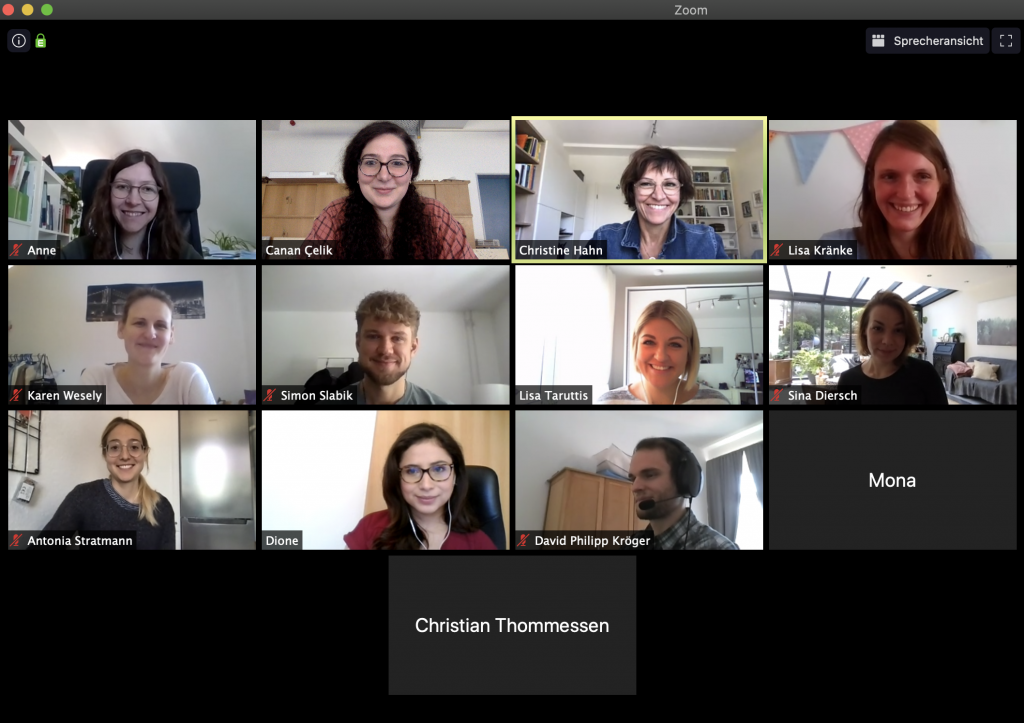
In the future, the exchange will continue to take place initially via online formats and we look forward to the upcoming PhD students’ meeting in June, which is being prepared by Mona.
14.05.2020 Vienna field trip// Post by Christian Thommessen and Anne Paulus
ASPERN SMART CITY RESEARCH GmbH & Co KG (ASCR)
FIELD TRIP TO ASPERN SEESTADT
The research company ASCR was founded by Siemens AG Österreich, Wien Energie GmbH, Wiener Netze GmbH and the City of Vienna (Vienna Business Agency, Wien 3420 Holding GmbH) with the aim of further developing and advancing the development of urban infrastructure in the area of conflict between climate change, resource scarcity and urbanization – in the sense of sustainability. The newly built district will be used to test the practical suitability of sustainable energy supply through own energy generation and storage as well as its control through intelligent networks. Figure 1 shows the ownership structure.
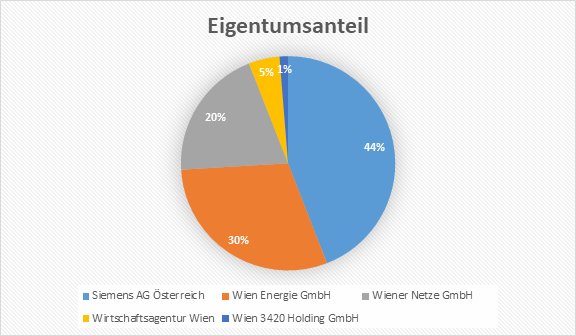
Figure 1: ASCR ownership structure of the companies involved
The development of innovative ideas and supply concepts (optimal coordination of generation, distribution, storage and consumption of energy) is carried out in Aspern Seestadt as a prototype implementation in a real environment. The annual budget for the achievement of the objectives amounts to about € 44 million, of which € 24 million are used for research activities.
A highly sophisticated research infrastructure was built in the urban development area. The core of the whole is a “smart grid” building automation, i.e. a uniform and comprehensive energy network control system. The automation solution is intended to connect the test buildings with each other in principle, i.e. to ensure secure communication and supply data protocols, as well as to control the energy supply intelligently and in a self-learning manner. The aim is to achieve a self-sufficient energy supply for the individual buildings in harmony with the other networked buildings in the district. A monitoring system was implemented for this purpose, which observes the energy requirements and energy storage of the buildings and, if necessary, acts as a virtual marketplace to stimulate the exchange of energy (“Smart Building”, see Figure 2). The test buildings are a residential complex (213 residential units), a dormitory (300 students) and an education campus with kindergarten and elementary school. In the future, a parking garage, which will also be equipped with the new system, will supplement the test campus. Among other things, it is hoped that this will provide insights into the areas of electromobility and parking space use. The more buildings with different types of usage are being investigated, the better it will be possible to derive results for mixed-use districts and coordinate the energy requirements of the individual buildings. So far, about 60 research questions have been answered, 15 prototypical solutions in the areas of intelligent buildings and network infrastructure have been developed and about 7,000 residents have been supplied with the help of the new energy management technology.
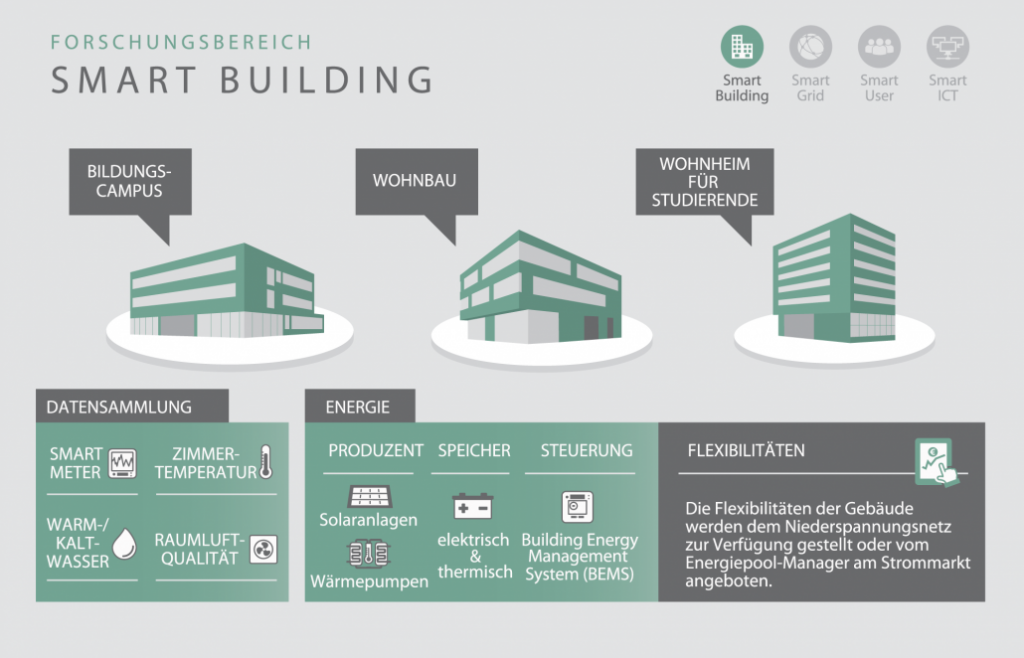
Figure 2: Schematic representation of research approaches in the building sector for optimising energy demands and trading in flexibilities
These successes result primarily from the fact that more infrastructure was built than would theoretically have been necessary for conventional energy supply. However, the infrastructure created was not used for research purposes, but also for benchmarking by installing technologies from different manufacturers and comparing their operation. The background to this are restrictions in the area of automation in the targeted cost- and energy-optimised operation of the system in the entire district.
Further research is still needed in the area of a major rollout of the automation technology in the district. It is worthwhile to investigate whether this would lead to a competition situation between some energy sources. In particular, the installed technologies for heat supply (solar thermal, heat pump, geothermal probes, thermal storage) fight against each other for the most favourable operating conditions during the heating period due to space limitations. Especially the usage of geothermal energy in winter “on a wide area” is to be critically questioned. However, the combination of photovoltaics and decentralised batteries does not yet appear to be the optimum solution for providing electricity either.
Based on the results obtained so far with regard to the individual supply of buildings and in particular the automatic building networking, it is already quite clear that the ASCR research association has taken on a pioneering role worldwide. By means of intelligent control, a more efficient self-sufficiency of buildings is achieved and less residual energy demand has to be covered by the public grid. Now it is necessary to find smart solutions to cover the remaining demand in a highly efficient way. In the northern district of Aspern Seestadt, e.g., a district heating network is planned.
The long-term goal is to develop a viable business model from the research results, which – as of today – is to be distributed by Atos IT Solutions and Services GmbH. With the results, the knowledge gained and the new knowledge from the ASCR project, design approaches for future laws and guidelines are to be derived. A special interest of the energy suppliers involved in the project is to protect themselves from “data companies” such as IBM or Google and to develop their own know-how in the area of data collection and targeted evaluation. Data play a central role in the business model, but do not replace the basic knowledge of the business, e.g. the construction industry or urban development and engineers or energy technology. Parts of the business model are already transferable to other applications.
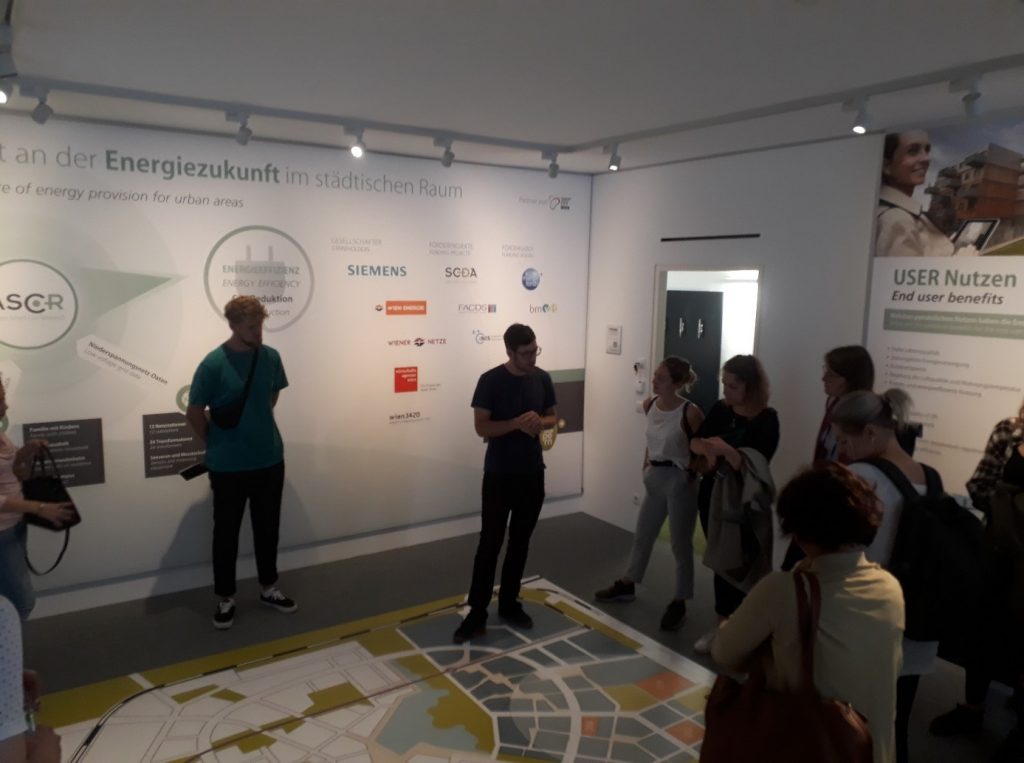
Figure 3: Visit of the NEQ Graduate School to ASCR
The NEQ participants were informed that international delegations regularly visit the site to see and explain the technology (Figure 4). As a result, ASCR expects the product to be ready for the market in the foreseeable future. Developers will then be able to implement the concept themselves and may only need the advice of Atos, which – in addition to the technical equipment itself – will then cost the necessary small change.
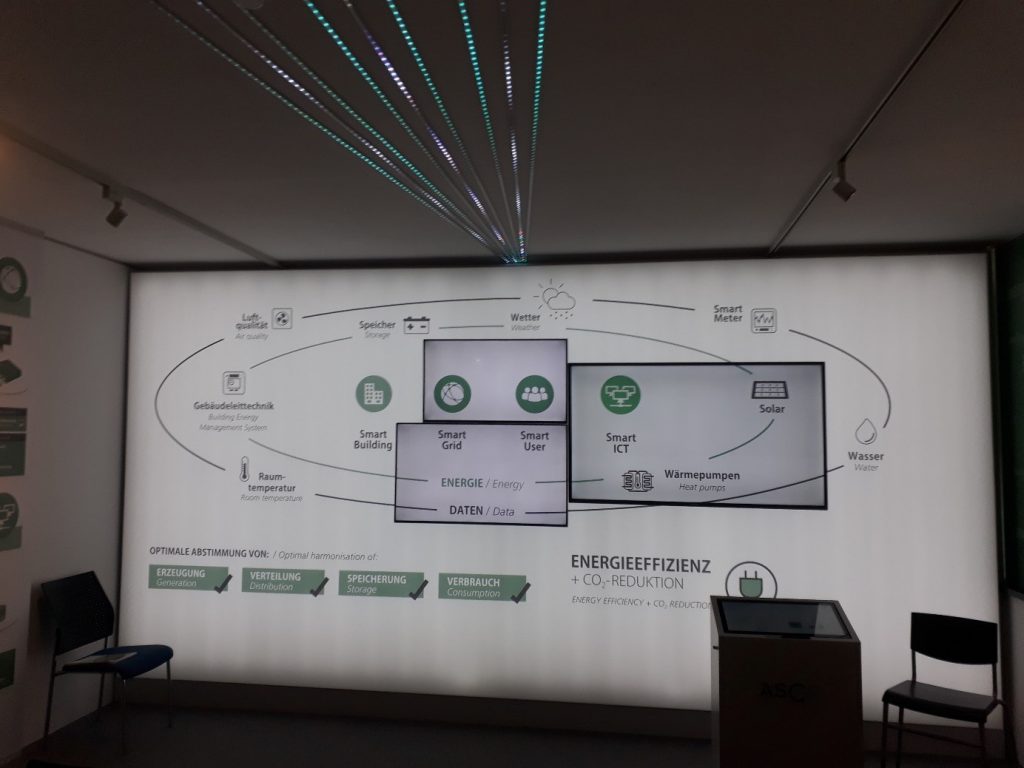
Figure 4: In the ASCR showroom, (international) delegations are received and the various findings from research are illustrated in a state-of-the-art manner
The topics described here as well as further findings and achievements of over 100 researchers involved in the project are documented in the final report ASCR 1.0.
Access the report here.
Contact:
ASCR Aspern Smart City Research: https://www.ascr.at
Oliver Juli, Program Office, Funding
+43 (0)1 908 93 69
oliver.juli@ascr.at
23.04.2020 Vienna field trip// Post by Lisa Kränke
VIENNA FIELD TRIP
WALKING TOUR THROUGH SIMMERING
… see german version
19.03.2020 Vienna field trip// Post by Antonia Stratmann and Anne Paulus
VIENNA FIELD TRIP
"VIERTEL ZWEI"
… see german version
06.03.2020 Special contribution// Congratulations
8|KSWD – 8th CONFERENCE FOR SOCIAL AND ECONOMIC DATA
CONGRATULATION LISA TARUTTIS ON THE 1st PLACE AT RatSWD POSTER-PRICE 2020
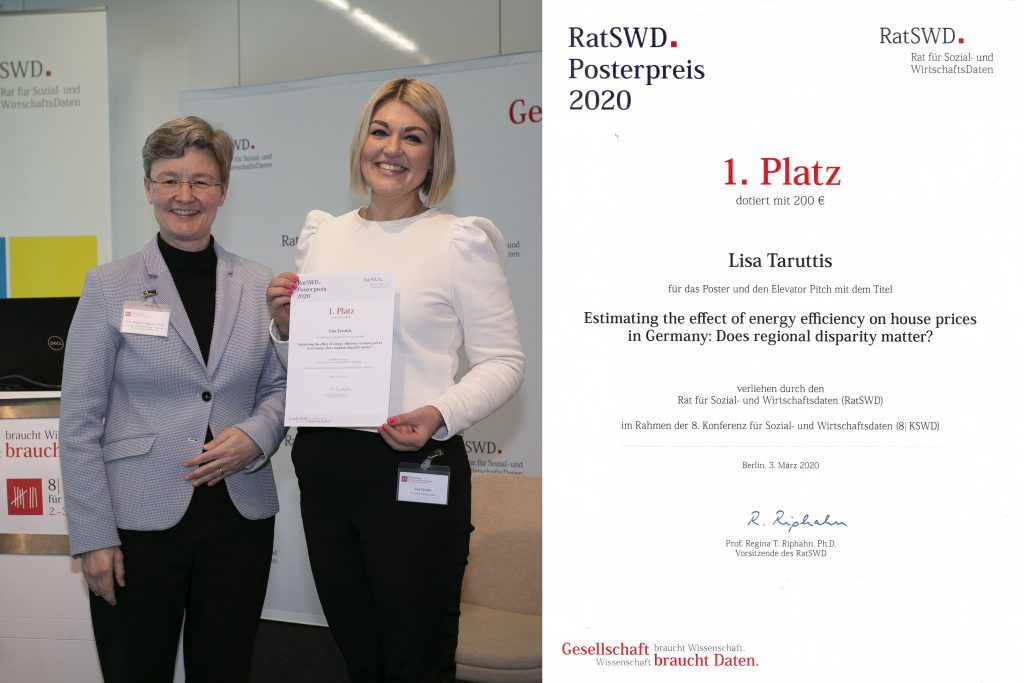
On 2 and 3 March 2020, the 8th Conference on Social and Economic Data took place. The conference is organized every three years by the RatSWD and this year it was hosted by the Heinrich Böll Foundation in Berlin. In addition to exciting lectures, panel discussions and even a science slam, young researchers were also not neglected: The Call for Posters was addressed to all scientists who use data from an accredited research data centre for their research. For the first time, a poster prize was also announced, in which the best three posters were selected by a jury (consisting of members of the RatSWD). In addition to the actual poster exhibition, where visitors to the conference can contact the authors of the posters and discuss the work, an elevator pitch was also one of the selection criteria for the posters prize: Here, the aim was to give the audience a foretaste in 90 seconds so that as many visitors as possible get interested in the poster. For this purpose, the poster was faded in for the audience for exactly 90 seconds via beamer – after the time was up, a signal sounded and the pitch was over!
From 40 applications 18 works were selected and presented in the pitches and the poster version. Among all invited young scientists Lisa could convince the audience and also the jury with her pitch and the corresponding poster and won 1st place in the end.
05.03.2020 Workshop// Post by Dione Hernández Galvis and Simon Slabik
RESEARCH METHODS
FOR PHD STUDENTS
After a very successful first seminar on “Good Scientific Practice”, the Graduate School NEQ organised on February 12th and 13th, 2020, a training course on “Research Methods for PhD Students”. The head of the Graduate Centre of the University of Siegen, Dr. Daniel Müller, led a partly interactive presentation through the workshop, in which the different interdisciplinary research methods were presented to the PhD students.
After an introductory summary of scientific theory and its origins, the different current subject cultures and methodologies were explained. The survey methods necessary for the preparation of scientific papers – especially from the sociological and economic fields – were then presented and illustrated by interactive examples. On the second day of the seminar, individual consultations were held with all PhD candidates, in which the methodological procedures were critically questioned and, if necessary, optimized.
All things considered, it can be said that the workshop on scientific research methods not only strengthened the understanding of the methodological procedures of each one of the dissertation goals, but also raised the awareness of the approaches of other disciplines. In the future, this will further improve the dialogue within the Graduate School. Thanks to the personal exchange with Dr. Daniel Müller, individual concerns could be attended.
20.02.2020 Vienna field trip// Post by Lisa Taruttis and David Kröger
VIENNA FIELD TRIP
VISIT TO THE WASTE INCINERATION PLANT SPITTELAU
The waste incineration plant Spittelau is located directly on the Danube and surrounded by several residential buildings in the 9th district of the city of Vienna. The plant is operated by Wien Energie – the largest energy supplier in the city. In 1991, the plant was put back into operation after it was completely destroyed by fire on 15.03.1987. Since the old plant did not exactly defy beauty, but rather resembled a grey concrete bunker, the design was left to the Austrian architect and artist Friedensreich Hundertwasser during the reconstruction. His influence cannot be overlooked: there are almost no straight lines throughout the entire complex – even the parking lot boundaries are curved. In addition, the building as a whole is very green, for example with planted roofs.
The guided tour through the waste incineration plant starts at station 1: the weighbridge for vehicles. About 130 trucks are in operation every day, delivering up to 6 tons of waste twice a day – this means that about 250,000 tons of waste are incinerated in the plant every year! The police also use these scales in one situation or another, for example when they suspect contraband in a vehicle, which is not directly visible.
On the way to station 2 – the garbage bunker forecourt – we passed the measuring points for radioactivity. After all, one does not want to burn radioactive garbage and possibly cause acid rain (even though this is – admittedly – extremely unlikely. But: Safety first!). Arriving at the garbage bunker forecourt, 8 big gates catch the eye, which were all in operation at noon and at the time of our tour. They are the lock to the garbage bunker, where the delivered garbage is collected and mixed well. Normally some gates are always closed to keep the odour nuisance as low as possible. During rush hours – and we seem to have caught one of them – however, all gates are needed so that the backlog of garbage trucks is not too big. Before the tour continued, we were told that the garbage bunker forecourt also has a real function: if the measuring points indicate radioactivity, the entire load of garbage is dumped here and searched by experts. Definitely not a dream job!
The next stop on our tour was inside the plant. Posters were used to explain the complete process of waste incineration to us. In short: the garbage is ignited with natural gas; the plant burns 24/7; the volume shrinks to about 1/10; about 220 kg of slag is produced per ton; the smoke produced during the incineration is filtered by a state-of-the-art flue gas cleaning system and leaves the tower as white water vapour. By the way: on this tower there are two nesting places for falcons, but they are only occupied when the steam contains as few pollutants as possible. A great indicator for impurities!
We went on to the crane places, which resembled an oversized grab arm. Here I think each of us would have liked to mix the garbage ourselves! With the help of these cranes and a thermal camera, possible sources of fire are directly avoided. In addition, too large pieces of garbage are sorted out – like once a whole VW beetle! How it got into the bunker is still a mystery today.
Last but not least we went to the “cellar” of the plant: here are some machines for cooling. Because cold, along with heat of course, is becoming more and more popular these days. With ultra-modern absorption chillers, the plant produces cold for the city, but at the moment only for large consumers. The machines are not powered by electricity, but by the waste heat from waste incineration! The water of the Danube is used to cool the plant. An all around super well thought out matter!
At the end of the guided tour, the tour continued into the world of experience, where younger generations can also make their first experiences on the topics of renewable energies and energy efficiency. All in all, it was an absolutely interesting tour, where both the “technology freaks” and all “non-engineers” got their money’s worth!
13.02.2020 Workshop// Post by Christian Thommessen
WORKSHOP
GOOD SCIENTIFIC PRACTICE
Within the Graduate School for Sustainable Energy Systems in Neighbourhoods, workshops for further education are held regularly. In this context, the PhD students participated in a training on good scientific practice at the end of January 2020, which was led by Dr. rer. nat. Peter Schröder. The one-day event focused on the questions “What is good scientific practice about?” and “How to implement the principles of good scientific practice?
Through many practical examples, the colleagues were shown how this topic affects their graduation, what duties and rights apply, what benefits they can derive from taking the guiding principles into account and how they can deal with any problems. A central finding was that good scientific practice cannot be defined, but only described. This is because the term is not unambiguous and is, e.g., interpreted differently depending on the discipline. However, there are fundamental guiding principles of good scientific practice which must be observed without fail (e.g. obligation to document or being critical of one’s own results or those of third parties). The DFG’s guidelines or, respectively, code of conduct provide a good overview.
In retrospect to the training it remains to be noted that the exchange of experiences with the lecturer as well as the colleagues (not only regarding the topic of this workshop) was and still is very important. The possibility to have such an exchange with others is highly appreciated by the NEQ participants and they are already looking forward to the upcoming training.
Further links to related topics:
Teacher Dr. rer. nat. Peter Schröder
DFG’s Gguideline on good scientific practice
30.01.2020 Dissertation topic// Post by Karen Wesely
RELEVANCE OF OBJECTIVE AND SUBJECTIVE AUTONOMY
IN THE CONTEXT OF ENERGY SAVING INVESTMENTS IN GERMANY
Climate protection presents one of the main challenges of the 21st century. Especially, when it comes to integrating renewable energies in the heat supply sector, a need for sustainable solutions for whole communities and quarters has emerged. In this context, citizens’ resistance and lack of willingness to participate in collectively used systems often constitute major problems. Understanding the decision behavior of homeowners as well as identifying the drivers and barriers of their motivation is crucial to successfully manage energy transitions.
Although research has been conducted analyzing citizens’ acceptance of renewable energy projects, only little attention has been given to the subjectively perceived energy autonomy of homeowners. Regarding shared energy systems, we assume that people tend to feel more independent and safer with their own heating boiler rather than with a collectively used plant. This subjectively perceived energy autonomy differs from the objectively existing one. Since an in-depth study dealing with the subjectively perceived side of energy autonomy and its relevance on homeowners’ decision to share sustainable energy systems is missing, we aim to develop a measurement tool for this construct. In a first place, qualitative methods like problem-centered interviews are used to get a better understanding of the underlying structure of the construct’s dimensions and factors. In a second step an operationalization is planned based on the principles of classical test theory and by using quantitative methods.
This study represents a first step in developing a measurement tool for future research by conceptualizing the construct of energy autonomy through qualitative techniques. Furthermore, it gives insights into homeowners’ drivers and barriers when participating in community-oriented projects and contributes motivation research in the field of energy saving investments. Practical implications will be provided to incentivize homeowners to participate in local renewable energy projects in order to successfully manage energy transitions.
23.01.2020 Conference// Post by David Kröger
CONGRÈS INTERNATIONAL DES RÉSEAUX ELECTRIQUES DE DISTRIBUTION
CIRED 2019
CIRED (Congrès International des Réseaux Electriques de Distribution) is a major international conference in the field of power supply systems. Since the early 1970s, the conference has been held every two years at different venues throughout Europe and is characterised in particular by its proximity to industry and its focus on distribution networks.
In 2019, the conference was held in Madrid and, over a total of four days, dealt with almost all current issues in the field of electricity supply. In six technical sessions, current research results and developments in the fields of plant engineering, planning, operation and control of electrical networks and many other topics were presented.
The opening of the conference was thematically determined by the EU legislative package Clean Energy for All Europeans. The legislative package comprises four directives as well as four regulations and, together with other legislative acts, constitutes the framework for the implementation of the Energy Union and the European climate and energy targets until 2030. In a panel discussion, representatives of various interest groups debated the challenges and opportunities of the new legal acts. In particular, the future role of prosumers was intensively discussed. Prosumer is a portmanteau word made up of the terms producer and consumer and describes an agent who can both purchase electricity and generate it and then consume it individually or feed it into the grid. The lively debate provided impulses for further work on the research questions of the NEQ Graduate School.
All in all, attending the CIRED 2019 conference provided exciting insights into a broad spectrum of practice-oriented content, and through direct contact with experts it was possible to gain valuable advice on planned examinations.
23.01.2020 Dissertation topic// Post by Mona Treude
THE SMART CITY APPROACH
AS A CONCEPT TO REACH CLIMATE PROTECTION AND SUSTAINABILITY GOALS
… see german version
15.01.2020 Dissertation topic// Post by Christian Thommessen
DISTRICT HEATING IN GERMANY
HISTORICAL BACKGROUND, CURRENT RESEARCH AND FUTURE BENEFITS
District Heating (DH) is based on the fundamental idea of using local fuel or heat resources – which would otherwise be wasted – to satisfy local customer demands for heating. Hereby, a heat distribution network of pipes act as a local market place. Traditionally, excess heat resources have their origin in other energy sectors, i.e. combined heat and power (CHP) plants for generating electricity generation or industrial processes. Today, there is an additional interest in the use of renewables in DH systems, e.g. geothermal, solar thermal, biomass. A combination of providing recycled or renewable heat is the focus for future DH systems. As a result ordinary primary energy supply for heat demands will be substituted and lower environmental impact will be achieved.
Globally, DH systems able to fulfil the fundamental idea are very different regarding their market penetration, use of resources, network size, as well as environmental impact. However, the main merit of DH is always similar: there are lower heating costs in (high) dense urban areas with concentrated heat demands, especially in times with high international fuel prices. The costs for heat generation, distribution and consumption are even lower when considering damage costs for climate impacts in the form of e.g. taxes.
In some countries DH systems provide heat to about half of the national building stocks, whereas there are other countries with only a few systems because of lower awareness or competitiveness. Commercial DH was introduced in the American cities of Lockport and New York in the late 19th century. Thereafter, the progress of DH has taken different directions across Europe. Most countries developed DH in response to minimize the importation of fuels. However, the first European DH systems were introduced in Germany in the 1920’s. The very first German DH system was operated in the city of Hamburg, because of a war straff: after the First World War France rose up the price on coal (in the Ruhr area). As a result, DH was a cheaper and more efficient solution for heating buildings. During both oil crises in the 1970’s, the international oil price rose so high that as a reaction, the general interest in DH and its optimization increased significantly. Utilities in Germany found that DH was the best way of using the energy from municipal waste, which is today an important part of DH schemes (e.g. in Vienna or Copenhagen).
The Scandinavian and German DH industries spent a lot of time and money on research and development to support the technological process. Improved energy efficiency and several (upcoming) fuel changes in the electricity sector, make CHP generation attractive. DH temperatures are crucial to the overall system efficiency. Current DH research focuses on optimizing supply and return temperatures, as well as optimizing CHP plant operation considering both, the electricity and the heating sector and markets, respectively. Hereby, thermal storages enable the DH to be supplied at the lowest costs and to bridge the time between heat generation and distribution. Furthermore, the development of better piping technology for the DH networks is ongoing. Pre-insulated piping systems are state-of-the-art since the 1960’s, but there are improvements needed in order to become the reliable, cost-efficient basis of novel DH schemes with lower temperatures. Finally, the mature technology of surveillance systems, sophisticated controls and heat meters needs to evolve and make DH smart in the sense of digitalization. Operating DH temperatures will be much lower than in the past (i.e. well below 100 °C), so that heat loss reduction and an efficient heat generation become crucial.
All in all DH technology is improving so that DH becomes a significant element of several heating markets in European countries, especially in Germany. Today, district energy systems are analyzed and planned in a more holistic way than in the past. In order to encompass several sectors (i.e. electricity, heating and transportation) DH is increasingly seen as an integral part of the overall energy system. In Germany DH can be an essential element to enable the usage of the increasing intermittent renewable electricity. This results in a more efficient usage of fossil fuels for residual loads and lower greenhouse gas or carbon emissions. In high-dense urban cities DH will be the form of heating with the lowest costs due to its ability to use a range of (locally available) heat sources, especially waste heat from CHP plants and industrial processes, as well as renewable heat. DH is a major benefit in increasing supply diversity and reducing dependence on imported fuels by third parties.
10.01.2020 Special contribution// Congratulations
EURAC RESEARCH
CONGRATULATION ANTONIA STRATMANN ON THE BEST POSTER AWARD OF THE SSPCR!
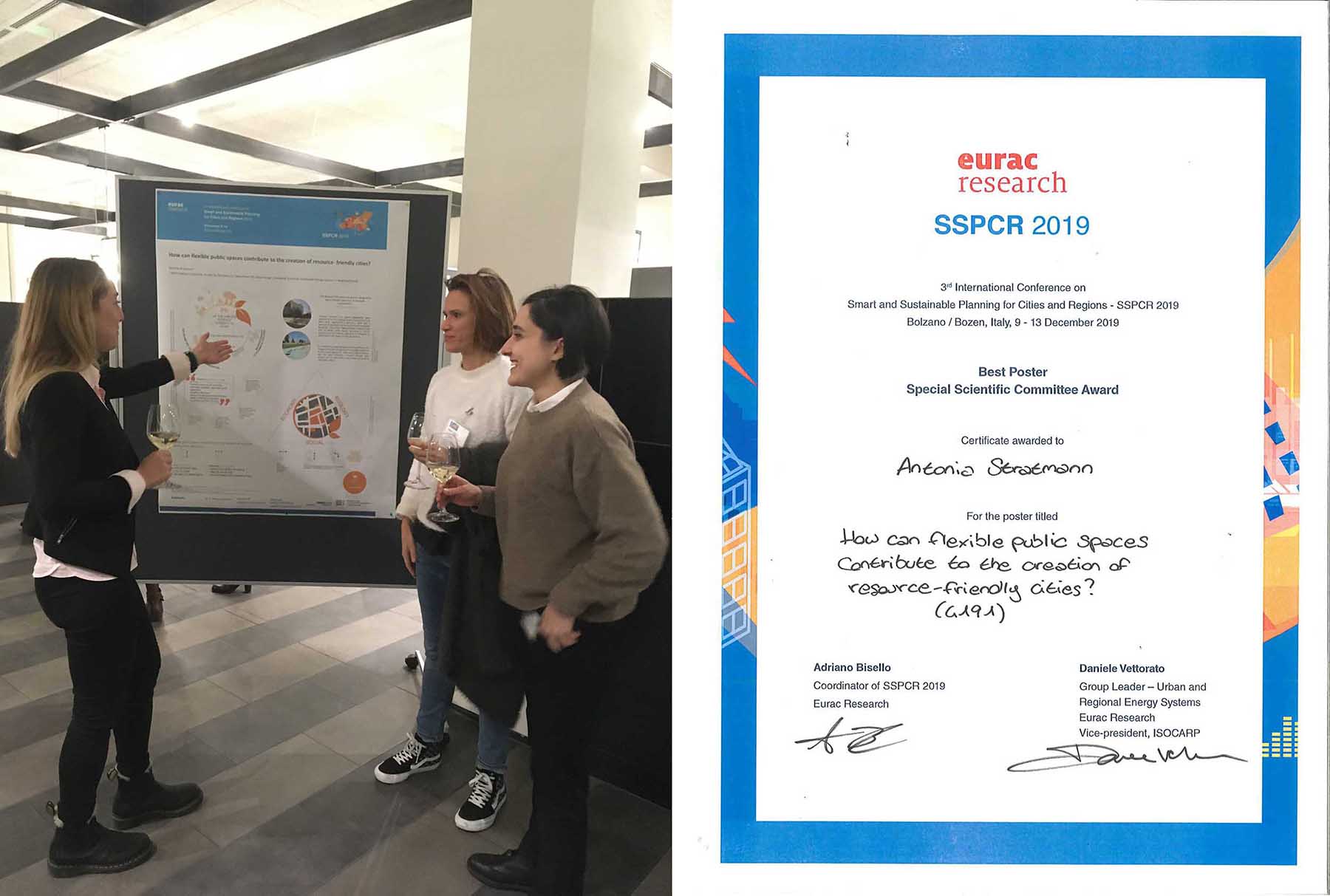
… see german version
10.01.2020 Conference// Post by Simon Slabik
CENTRAL EUROPE TOWARDS SUSTAINABLE BUILDING 2019 (CESB19)
PRAGUE, CZECH REPUBLIC
The Sustainable Built Environment (SBE) conference series was first launched in 2000 and has since been held at regional, national and global levels every three years. The stated main objective of the conference series is to disseminate innovative strategies and development related to sustainable urban development to the widest possible audience. Through the 2015 EU adopted resolution “Agenda 2030” for sustainable development, the international community states that the global challenges can only be solved through international cooperation. Thus, the development of 17 Sustainable Development Goals (SDGs), which together with 169 objectives cover all three dimensions of sustainability, is the main component of this agenda.
For the fifth time in a row, the Faculty of Civil Engineering, the Klokner-Institute and the University Center of Energy Efficient Buildings (UCEEB) of the Czech Technical University in Prague organized the regional conference. Topics this year included: The innovative use of materials and products in sustainable buildings, energy efficient systems, sustainable refurbishment of existing buildings and sustainable urban development.
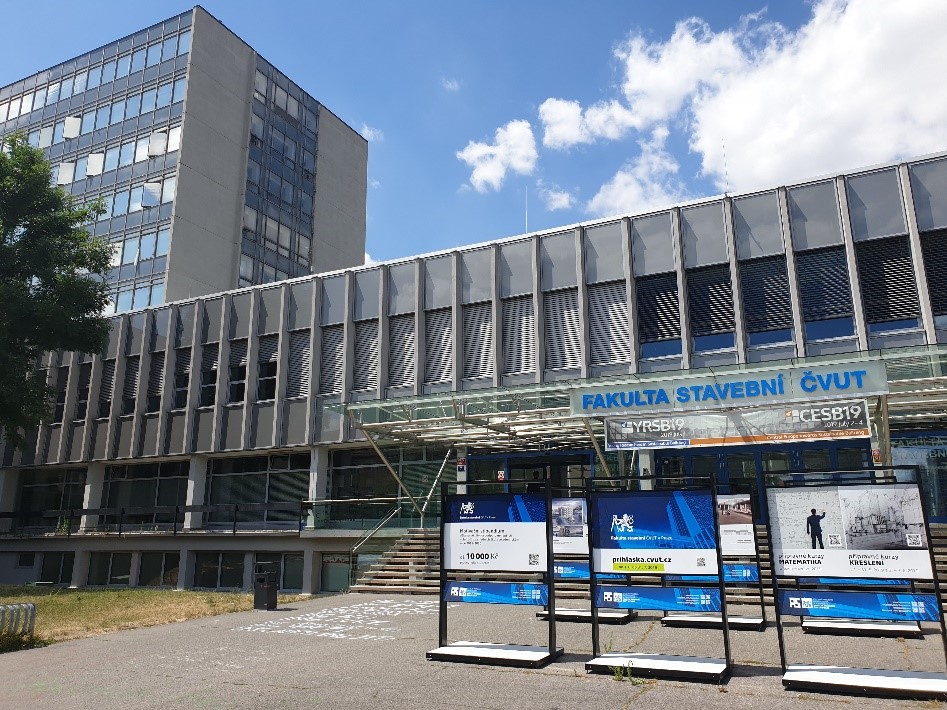
Foto: Faculty of Construction Engineering, Klokner-Institute and University centre for energy-efficient buildings (UCEEB) of the Czech Technical University in Prague organized the regional conference for the fifth time in a row.
Under the chairmanship of Petr Hajek, Richard Lorch and Harald Mueller initially held the keynote speeches in which the shed light on the current discourse of climate change in the context of building issues. Harald Mueller also presented a climate-friendly variant of concrete production (eco-concrete or green concrete), which reduces greenhouse gas emission compared to the usual production. The following sessions dealt in particular with the topics of refurbishment and materiality as well as their influence on the built environment. In the coffee and lunch break, it was easy to get in touch with the various exhibitors and speakers to discuss current problems in urban development and the building sector.
The second day of the conference was initiated by keynote speeches by Dr. Oesterreicher, Mr Treberspurg and Prof. Dr. Luetzkendorf. On the one hand, the focus was on large-scale urban development in Austria based on the example of the “Seestadt Aspern” in Vienna and, on the other hand, the consideration of sustainability studies with different examination aspects. As part of the Graduate School for Sustainable Energy Systems in Neighbourhoods, we had the opportunity to visit “Seestadt Aspern” in September 2019 and inspect the planning and practical concepts on site.
The conference concluded on the third day with further sessions, which addressed the materiality, the recycling potential of building products, processes of policymaking, sensitization campaigns and economic optimization instruments.
In summary, the CESB19 conference in Prague was an exciting event, providing deep insights into the very broad research landscape of sustainability and the built environment. The conclusions and established hypotheses must now be confirmed and research in depth in order to develop effective measures to combat climate change.
10.01.2020 Dissertation topic// Post by Lisa Taruttis
SUSTAINABLE INVESTMENTS IN ENERGY EFFICIENCY AND RENEWABLE ENERGY TECHNOLOGIES
A HOME-OWNERS' PERSPECTIVE WITH EVIDENCE FROM GERMANY
In Germany, around 35% of the final energy consumption and about one third of the CO2- emissions are related to the housing sector. According to the Energy Efficiency Strategy for Buildings (ESG), the German government aims at a climate-neutral building stock by 2050 to reach the goals defined in the Climate Action Plan 2050. For this purpose, energy efficiency of buildings is to be improved on the one hand, and on the other hand the remaining energy demand is to be covered predominantly by renewable energies. The focus will be set on energy efficient retrofits, since a large proportion of the buildings existing in 2050 already exist today.
In the first cohort, my predecessor Dr. Paul Baginski has already dealt with “Key Drivers and Barriers for Energy Efficient and Sustainable Household Investments”. The aim of my doctoral thesis is to build on these results and to empirically investigate the various economic effects resulting from these sustainable investments. The focus here is on the one hand on uncovering possible monetary benefits that can be generated by energy-saving renovation measures, and on the other hand on the analysis of neighborhood and spillover effects. In addition, regional disparities are investigated, so that the results can be transferred to different neighborhoods.
An essential part of my cumulative dissertation is the use of small-scale raster data, which is gaining more and more attention in the field of spatial analyses. In my studies I will draw on different (spatial-)econometrical models. Due to the inter- and transdisciplinary orientation of our graduate school and the associated synergy potential between different projects, however, the application of other, e.g. qualitative methods is also conceivable.
10.01.2020 Conference// Post by Dione Hernández Galvis
SMART CITY EXPO WORLD CONGRESS 2019
The Smart City Expo World Congress 2019 is a leading international event which started back in 2011. It took place on November 19th – 21st, 2019 in the city of Barcelona. The event counted with the attendance of twenty-five thousand people from all over the world. The plethora of topics and projects that were introduced during these three days are astonishing. The congress englobes many topics that are in line with the objectives of the Graduate School, this motivated the participation at this three days’ venture, which offered new perspectives specially regarding the digitalisation of the energy transformation.
The slogan of the event was “cities made of dream”, the opening keynote was an allusion to what could be one of Eleanor Roosevelt’s most famous quotes: “the future belongs to those who believe in the beauty of their dreams.” The aim at the conference was to dream of a smart urban revolution triggered by the main focuses: Digital Transformation, Urban Environment, Mobility, Governance and Finance, and Inclusive and Sharing Cities. Simultaneously, workshops, side events and summits regarding smart cities and regions, digitalisation, analytics and infrastructure took place.
Since renewable energies are of particular importance for the achievement of smart cities, the relevance of the seasonal storage of electricity goes without saying. The City of Stockholm and the Stockholm Royal Seaport offered an interesting insight regarding the challenges and solutions in this area to which they have been confronted with. In this same line of thought, the European Energy Research Alliance presented good practice examples and debated the best ways of implementation. Besides, Yostina Beules from London confronted herself with the question: “What policies local government need to implement to improve energy performance and lower emissions?”, since her area of expertise is energy transition, her approach to the topic and the reference to technology 4.0 as an enabler of the energy transformation were especially elucidative.
Furthermore, strategies in order for cities and nations to be “smart” by means of IoT, city platforms and international standards were thoroughly analysed, discussed and agreed upon. It results compulsory to mention that the congress had numerous sessions concerning how to develop smart and sustainable cities, offering not only best practices and guidelines, but also methodologies.
18.12.2019 Dissertation topic// Post by Antonia Stratmann
HOW CAN FLEXIBLE SPATIAL STRUCTURES CREATE SUSTAINABLE NEIGHBOURHOOD DEVELOPMENT?
The demands of society on its built environment, as well as ecological and economic factors, require a constant adaptation of public urban spaces and their uses. Although only three percent of the earth’s surface consists of cities, these are the main drivers of climate change. Spatial and urban planners have to do with urbanisation, soil sealing, scarcity of resources and environmental pollution and play a decisive role in the implementation of sustainable adaptation measures and in ensuring the climate stability of spatial developments.
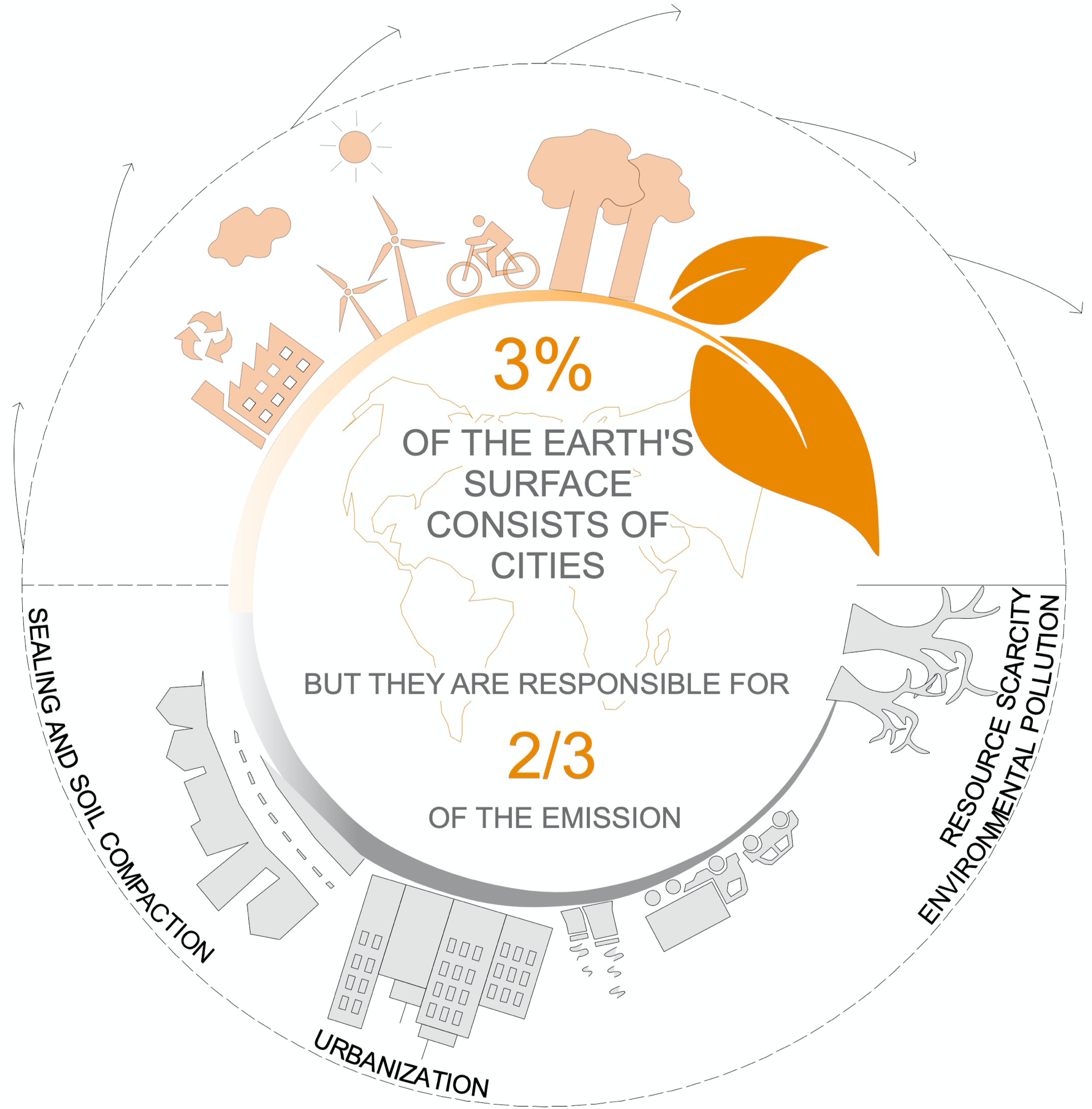
Figure 1: indicators climate change and urban development: rethinking in politics and society
The development trends show a dynamization of the urban development structure of use across almost all use-relevant manifestations in their spatial effects. An ever shorter duration and validity of spatial determinations of locations for individual uses require new solutions in urban planning. Since forecasts for the future are uncertain, it is necessary to find solutions that are flexible, adaptable and open to change.
The aim of the research work is to develop individual tools for flexible land use in a neighbourhood and to present them in a toolbox. The concept of the toolbox is suitable because individual tools can be used independently of each other in space and according to the conditions. The Toolbox is therefore adaptable over time, open for new tools and at the same time offers a structural framework and orientation aids.

With the aim of creating urban development flexibility in neighbourhood development, it is to be investigated (1) how flexibility in urban development is defined, (2) what influence flexible structures have on urban development and, in the last step, (3) how sustainable neighbourhood development with flexible urban development structures can be designed using the example of an investigation area.
Currently, I am dealing with the questions flexibility in urban planning. What does flexibility mean in urban planning? When are structures flexible? What expectations do users have of flexible land use? What types/forms of flexibility are there? What influence does flexibility have on urban planning? Which definitions can be found in the literature?
Initial literature research has shown that flexible public spaces guarantee sustainable, resource-friendly urban planning because …
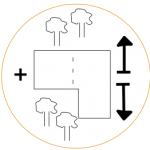
… IT IS ADAPTABLE
+ FOR DIFFERENT USES
+ FOR ITS USERS
+ IN TIMES OF UNCERTAINTY
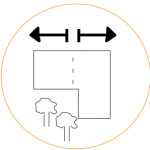
… CONSUME LESS GROUND
+ USAGE CAN HAPPEN IN PARALLEL
+ AND/OR SIDE BY SIDE
+ OFFERS HYBRID SPACE ORGANISATIONS
The following definition has emerged from these points: „Flexibility is a designing tool to achieve resource-friendly spatial planning. Flexibility measures are: reversible, removable, adaptable, adjustable and/or upgradable.
Flexibility criteria are: Value of change and reconstruction possibilities, potential of expansion possibilities and value of reuse“
The following is an outlook and examples for the design of flexible public spaces. For the dissertation, the influence of flexible structures in urban planning will be investigated further.

Figure 2: Open public space in La Barceloneta, Barcelona, Spain
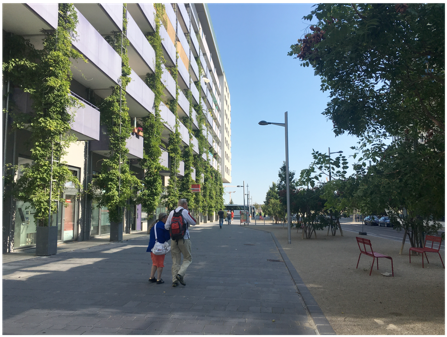
Figure 3: Open public space in Aspern, Vienna, Austria
The illustrations 2 and 3 show public spaces in two European cities. The public space in La Barceloneta (Figure 2) was already planned in 1983, the public space in Aspern (Figure 3) has been implemented 2009 according to current planning guidelines, and with the knowledge of the necessity of flexibility and adaptability. Although the two squares were built at different times, they have a number of things in common: a wide promenade, the possibility of staying and resting through benches, greenery and light.
In the next blog post on the status of my dissertation topic, the influence of flexible urban development structures on sustainable neighbourhood development will be shown in order to come closer to the goal of developing a toolbox that contains various building blocks for sustainable implementation (in terms of time and content).
10.01.2020 Dissertation topic // Post by Simon Slabik
THE IMPORTANCE OF LIFE CYCLE ASSESSMENT (LCA) AT THE NEIGHBOURHOOD SCALE
NEW CONSTRUCTIONS, REFURBISHMENT AND MODERNIZATION MEASURES AND THEIR ENVIRONMENTALLY RELEVANT IMPACT
In the structural context, the neighbourhood offers an interesting and increasingly focused level of observation. As an interface between individual buildings and the entire urban structure, it offers an extensive spectrum of research. The building sector is responsible for about one third of all greenhouse gas emissions in Germany. Regarding various political objectives, the German government has also committed itself to reducing primary energy consumption in buildings by 80 percent until 2050, for example. The energetic refurbishment of existing buildings is essential here, as the majority of existing buildings will still exist in the year 2050. The synthesis of upgrading the building’s building envelope and integrating sustainable and efficient energy systems ensures a positive impact on the environment by minimising the heat and electricity demand of the building.
In order to consider and evaluate the environmental impacts, the method of the life cycle assessment (according to EN 15978) is applied to the neighbourhood under consideration. The focus here is on a holistic approach which analyses not only the building structure but also the infrastructure, pipelines and other traffic and open spaces. Spatial and temporal system boundaries must be adjusted accordingly, and a meaningful functional unit serves to quantify the benefit and for use as a comparison unit. Finally, the adaptation will be implemented and validated at different quarters.
As part of the Graduate School for Sustainable Energy Systems in Neighbourhoods, the research question can be dealt with in a coherent manner. The inter- and transdisciplinary approach also provides deep insights into the complex relationship between building material and energetic modernisation, economic parameters and the ecological restructuring of the built environment.
05.12.2019 Conference// Post by Christian Thommessen
ISGT EUROPE 2019
SIGNIFICANCE OF COGENERATION FOR GERMANY’S FUTURE ENERGY SUPPLY
The IEEE PES Innovative Smart Grid Technologies Europe (ISGT Europe) took place from 29 September to 2 October in Bucharest (Romania) at University. ISGT Europe is one of two flagship conferences of the IEEE in Europe and enjoys a high reputation. The focus is on industrial and manufacturing theory as well as applications for the broad application of information and communication technologies and the integration of renewable and distributed energy resources into the electric grid. The conference attracted 400 researchers, practitioners and students from all over the world. The main topic was “New Businesses for Energy Transition” and featured keynotes, plenary sessions, panels, industry exhibits, paper and poster presentations and tutorials on smart grid and related technologies.
The Graduate School for Sustainable Energy Systems in Neighborhoods was represented by M.Sc. Christian Thommessen and his paper entitled “Significance of Cogeneration for Germany’s Future Energy Supply”. The background to this contribution is that the ongoing expansion of renewable energies is leading to changes in the energy supply. More flexibility is needed in the provision of electricity because the dependence on volatile supply increases due to the addition of e.g. wind turbines. These new developments have the effect that the operating times of conventional power plants change characteristically, which is essentially related to the residual load which must be provided by controllable systems. Today, several studies solve the future flexibility challenge in a non-congruent way because of rigid viewing points. In the published paper related to the ISGT Europe 2019 an analysis on the role of distributed cogeneration plants as flexible supply option in Germany’s urban energy systems is made. The results show that major fluctuations of the residual load can be covered by cogeneration plants. Furthermore, the necessity of sector coupling is revealed.
Within the conference program was the presentation of the paper. Afterwards were discussions about using existing infrastructure in the future (green gas grid), the rollout of District Heating systems in Germany, and required changes of the current regulatory framework. The final conclusions shall be summarized here in a compressed form:
- a flexible and 100 % renewable coverage of the remaining residual load must be ensured;
- a distributed system including (green) gas-fired cogeneration, wind and solar plants can provide clean energy;
- sector coupling is a complex issue regarding: technology, regulatory, organization, networking and cooperation;
- the cogeneration of power and heat means the usage of potentials, because it is high efficient and profitable;
- an expansion of District Heating is needed in Germany;
- a stepwise gas grid conversion must provide green gas for the supply of the remaining residual load;
- in any case, taking notice of flexibility requirements for the power grid is important.
After the session Professor Virgil Dumbrava thanked for the interesting lecture given. He encouraged everyone to continue working and to show further progress at next year’s conference. He found the contribution to the Graduate School for Sustainable Energy Systems in Neighborhoods particularly exciting. Therefore, he handed a certificate.
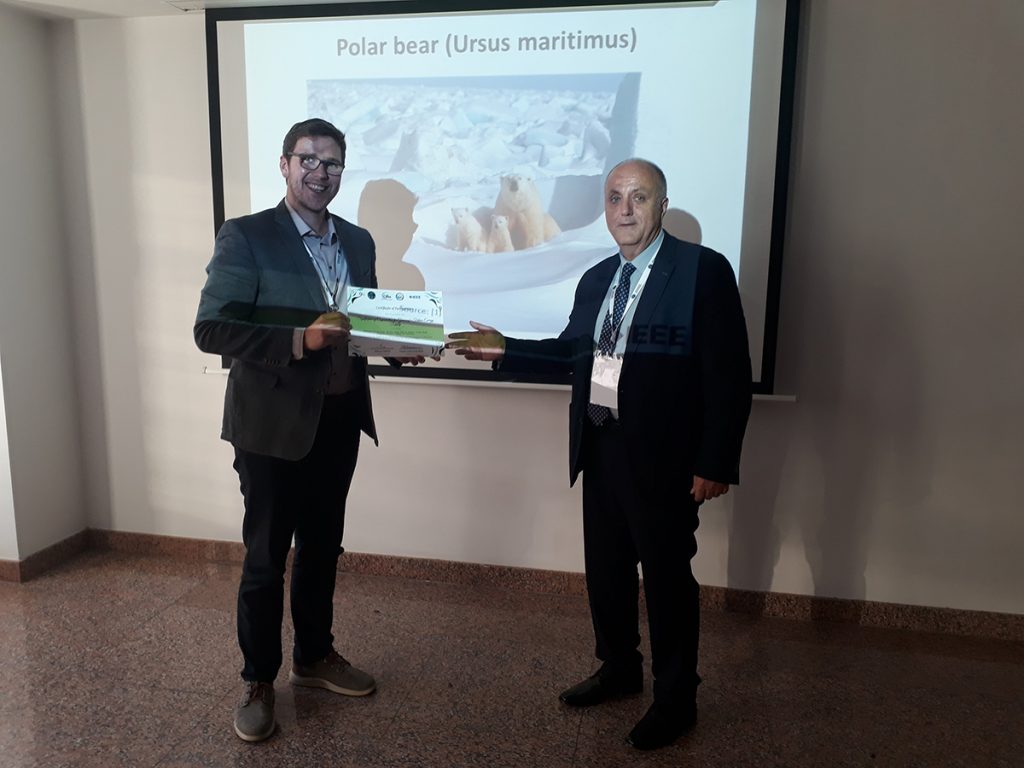
Picture: Christian Thommessen (University of Duisburg-Essen, Chair of Energy Technology) receives the conference certificate from session chair Virgil Dumbrava (Professor at University Politehnica of Bucharest).
11.12.2019 Dissertation topic// Post by Anne Paulus
SUSTAINABLE MOBILITY IN THE NEIGHBOURHOOD
A STUDY OF ACCEPTANCE
… see german version
27.11.2019 Dissertation topic// Post by David Kröger
ELECTRICITY MARKET AND GRID SIMULATIONS
WITH SPECIAL CONSIDERATION OF AN INCREASING CONNECTION OF THE ELECTRICITY AND HEAT SECTOR IN THE NEIGHBOURHOOD
Integrated energy systems, in which the electricity and heat sectors are coupled with each other, have the potential to deliver energy efficiently, with low emissions and in a flexible manner. The aim of my research is to examine how an increasing coupling of the sectors electricity and heat in neighbourhoods affects European electricity markets and the transmission grid.
The joint generation of electricity and heat in combined heat and power (CHP) plants, and the supply of heat using power-to-heat (PtH) plants based on renewable energies (RES), open up the potential for the decarbonisation of the heat sector. At the same time, coupling technologies can help to integrate the intermittent electricity generation from renewable energies into the system. Depending on their design, CHP plants have one or two degrees of operational freedom. In CHP plants with two degrees of freedom, the feed-in of thermal and electrical power can be controlled separately and thus contribute to RES integration in the short term. In times of negative residual load, particularly large-scale PtH can be used to transfer surpluses from the electricity sector to the heat sector and use them there. The additional use of heat storage units allows time-decoupling of generation and consumption of heat, further increasing the flexibility of the overall system.
Within the Graduate School for Sustainable Energy Systems in Neighbourhoods (NEQ), an already existing European electricity market and transmission grid simulation framework is being further developed to map the realistic use of CHP and PtH and to investigate and evaluate the resulting implications for electricity markets and grids. For modelling the heat sector, locations, installed generation capacities and storage technologies as well as heat demands of a multitude of heat networks in Europe were researched and temporally resolved. Subsequently, the additional restrictions and degrees of freedom in operation resulting from the sector coupling as well as different target functions of plants are to be considered and implemented. Finally, the use of CHP and PtH as well as heat storage can be determined and examinations regarding flexibility and grid load can be carried out.
The second phase of the research project deals in particular with research questions of sector coupling at neighbourhood level. For different penetration rates of the approaches developed in the first funding period, studies will be carried out with regard to the effects on European electricity markets and the continental European interconnected grid.
21.11.2019 Dissertation topic// Post by Lisa Kränke
SUSTAINABLE NEIGHBOURHOOD DEVELOPMENT
IN BOCHUM-HAMME
… see german version
20.11.2019 Dissertation topic// Post by Dione Hernández Galvis
DIGITALISATION OF THE "ENERGIEWENDE":
LEGAL FRAMEWORK FOR A MORE EFFICIENT IMPLEMENTATION OF SOLAR ENERGY IN SMART NEIGHBOURHOODSThe aim of the research is to develop a proposal in order to optimize the current German legal framework for the development of the “Energiewende” through digitalisation and for the more efficient use of solar energy in neighbourhoods.
The existing German legal framework is no longer seen as a motor, but rather as an obstacle to the German “Energiewende”. In the area of solar energy, there is a specific problem: homeowners are becoming entrepreneurs due to the problem of tenant flows. In addition, solar power cannot be distributed in neighbourhoods. The main question will therefore be to what extent the existent German legal framework will have to change in order to harness the opportunities offered by digitalisation for the energy industry. The focus will be on energy law, civil and contract law, data protection and IT security law.
First of all, the current status of the German legal framework will be examined. Then, a comparative analysis of the other modern legislations will follow. Various regulatory approaches and “best practices” examples may as well will be used to develop a reform proposal. The comparative analysis will focus on the EU level. Nevertheless, the inclusion of supra-European best practices cannot be ruled out. The countries that will serve as comparative goals will be determined after the deficits in the German legal framework have been identified. This will make it easier to assess which regulatory approaches/frameworks/means of control or similar can be used in Germany.
The main topics of investigation are the so-called “smart contracts”, the IoT, the digitalisation as a megatrend and the new business models (these would represent the connection to neighbourhoods, e.g. the prosumers and the distribution of solar energy neighbourhoods). The term “neighbourhood” is initially alien to German (energy) law, nonetheless there are neighbourhood-relevant arrangements in the sense of criteria which can be helpful for the formation and demarcation of a neighbourhood. We must acknowledge the inexorable development of new scenarios that are not yet provided for in our current legal dimensions or framework conditions. The unimaginable developments in the technological field with which we will be confronted represent for our institutions and our coexistence in society great challenges. However, it is necessary to acknowledge the importance of the conditions of our legal framework, since they can decisively influence on the actors involved. Without extensive digitalisation of the energy industry, it will be difficult to achieve the intended “Energiwende”. Following the motto “Think Global, Act Local”, this interdisciplinary approach helps to answer the main questions of the Graduate School on the one hand, and to shape the future social and political challenges in a positive way on the other.
13.11.2019 Dissertation topic// Post by Sina Diersch
SHORT-DISTANCE MOBILITY IN THE CONTEXT OF URBAN TRANSFORMATION
INNOVATION PERSPECTIVES THROUGH REAL-WORLD EXPERIMENTSThe design of human scale urban mobility in the context of energy and resource transition is one of the key challenges that mobility and urban planning is currently facing. In urban areas, short-distance mobility as the most energy-efficient, healthiest, climate- and resource-efficient form of mobility, constitutes the basic component of a socio-ecological transformation of transportation. Being central to the energy transition, a traffic turnaround alongside (technical) infrastructure also requires the establishment of flexible forms of mobility behavior and the creation of new responsibilities and regulatory requirements. In this context, urban neighborhoods serve as incubators for the development of evidential approaches. That is because, in their function as the source and destination of everyday mobility, they can both be initiators of a change in consciousness and behavior as well as impulse generators for changes in basic conditions and decision-making structures. Often, however, the implementation of mobility research innovation fails because of occurring problems concerning the transfer into practice. In this context, setting real-world and experimental impulses, which make mobility tangible – not only in the sense of a technological but also an institutional experimental culture – can exemplify new perspectives for a traffic turnaround as a transformative learning process.
Accordingly, with the help of explorative approaches of transformation research, the objective of my PhD project in the research college NEQ is to investigate implementation-oriented and experimental perspectives of urban mobility in and for the real urban context of the neighborhood. The neighborhood as a learning and opportunity space in which mobility-relevant experimental settings can be made operable in a transdisciplinary and co-creative process, and scientific and non-scientific perspectives can be linked in real-world experiments. Real-world experiments should be considered as instruments of transformative knowledge generation and application. With their help, mobility research should not only be transferred into practice but further developed. The application-oriented research approach of the project under the research-guiding question “Which perspectives for the transformation of urban mobility result from real-world experimentation in the neighborhood?” lies therefore in the ‘knowledge-action-gap’ of urban mobility research and planning. For the evaluation of relevant implementation strategies, the contextualization of the mutual dynamics of society, space and governance is the first main focus of the investigation. Subsequently, it is important to systematically evaluate real-world experiments for their effect on those dynamics in an iterative process. In addition, the relevance of transformative research formats as experimental spaces for mobility research is one of the main research interests.




